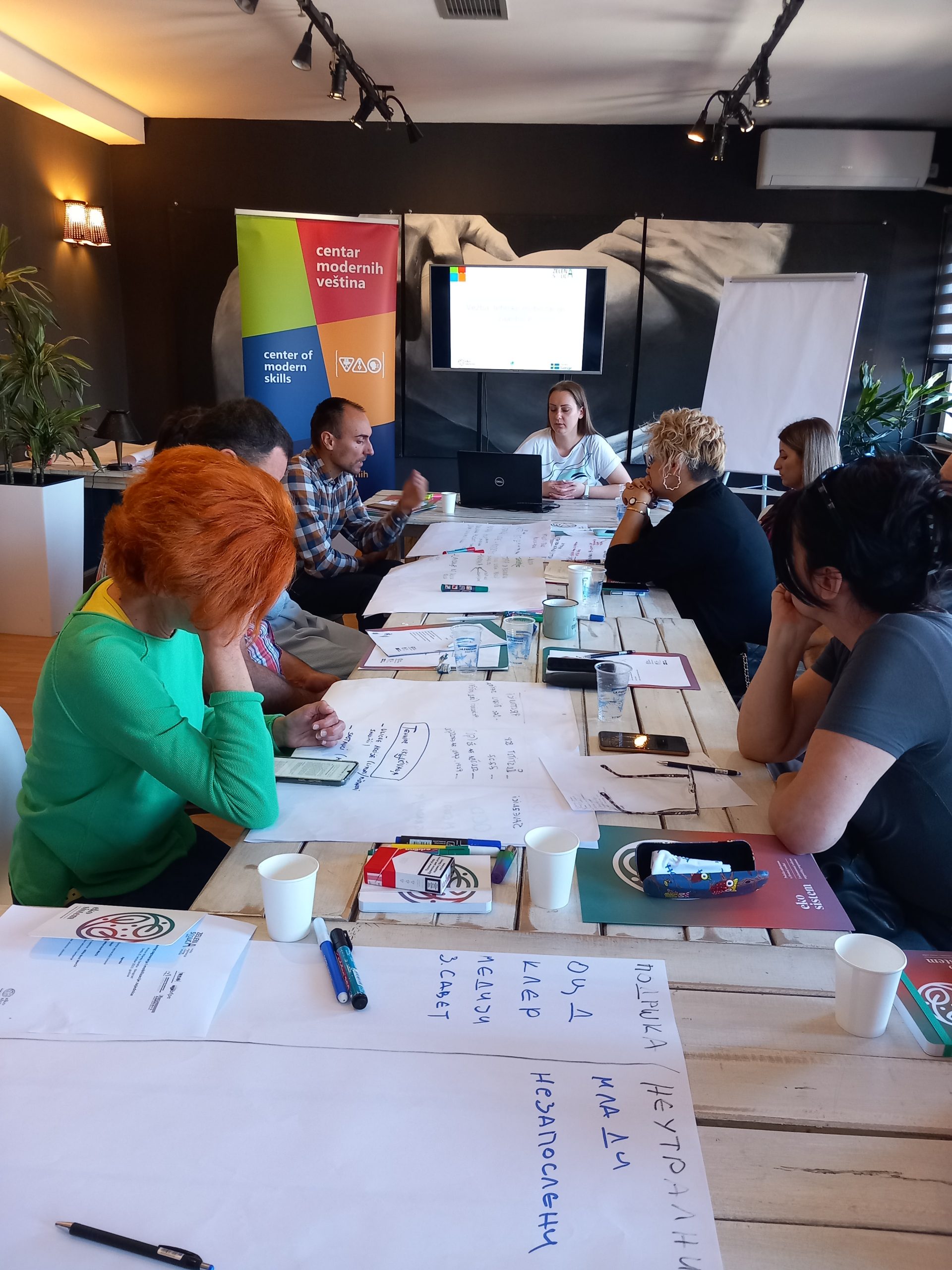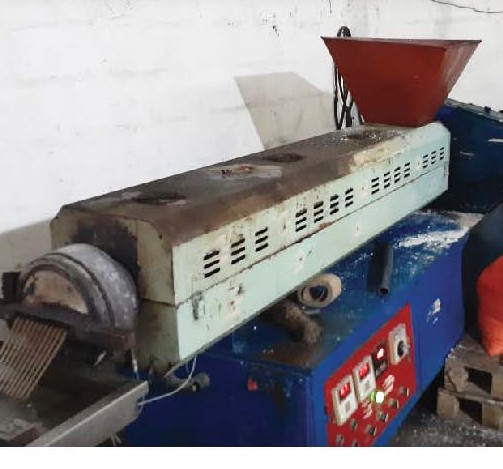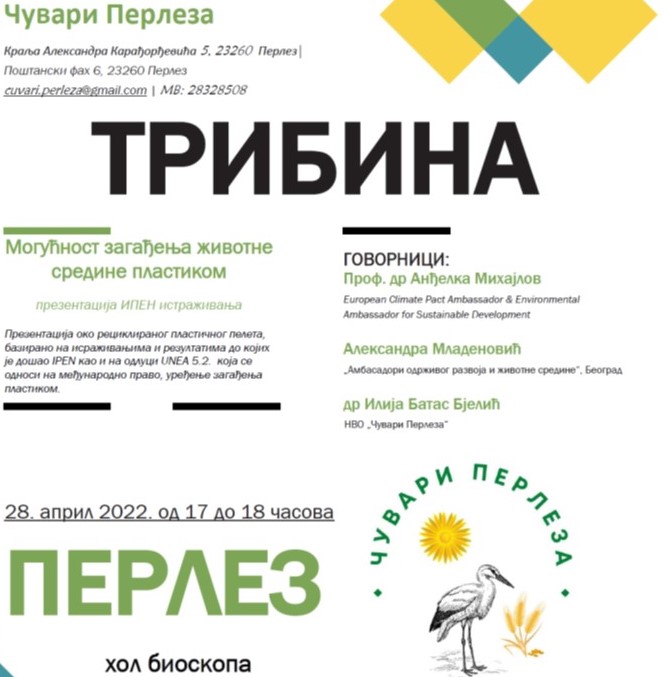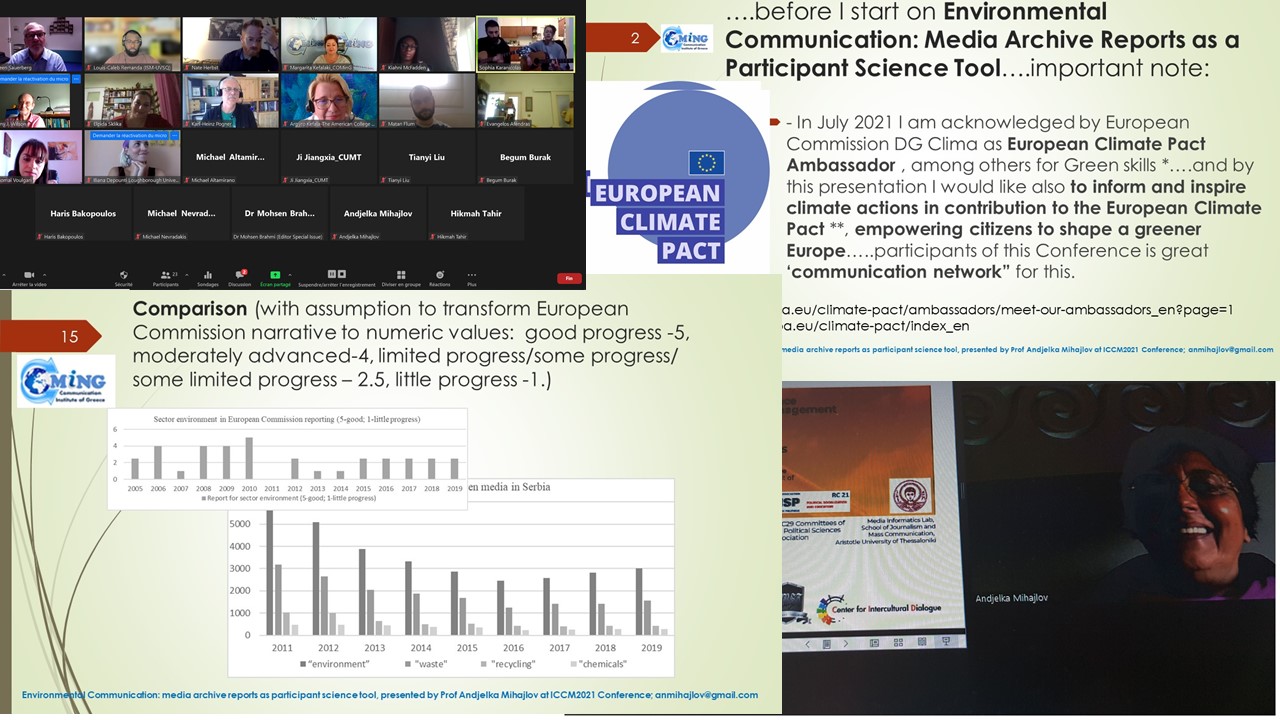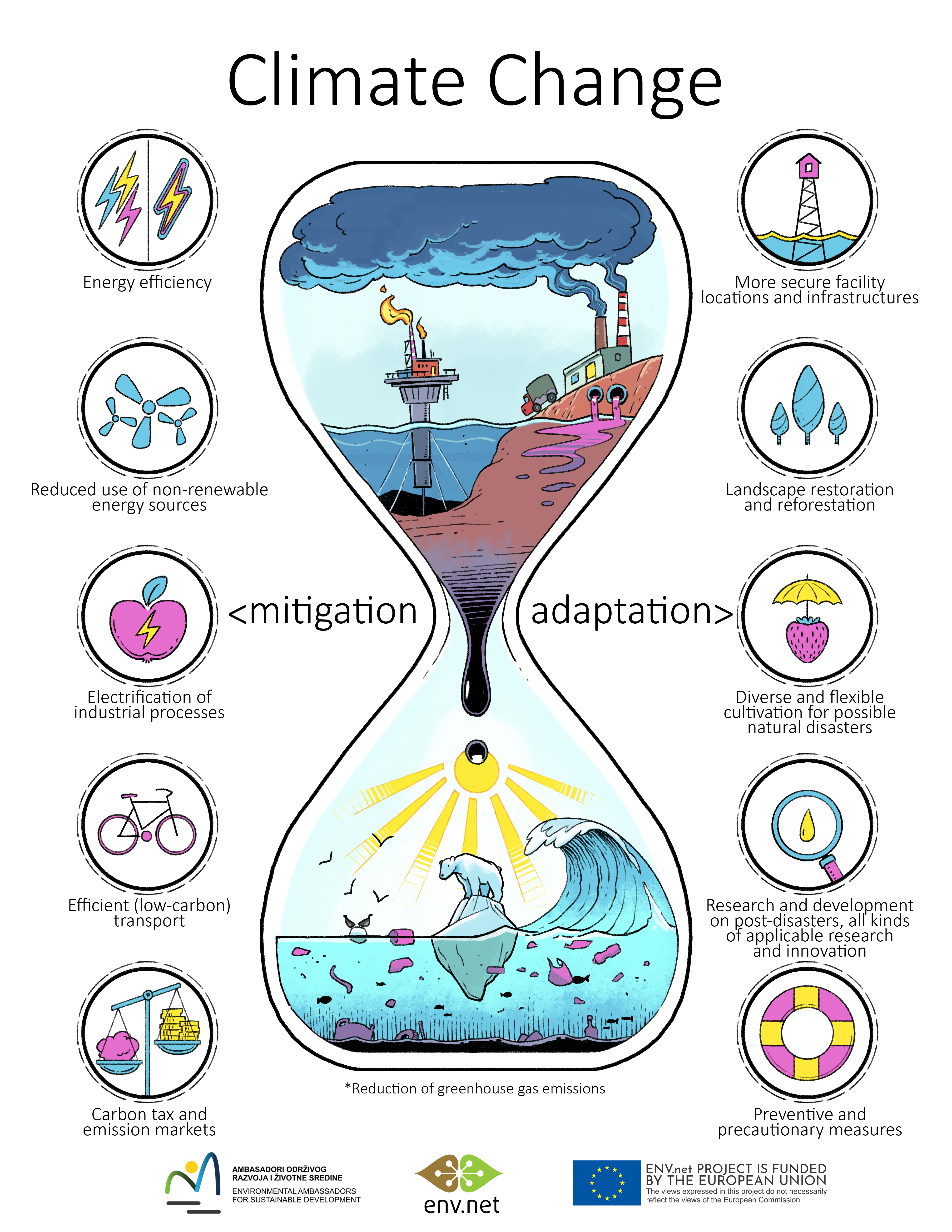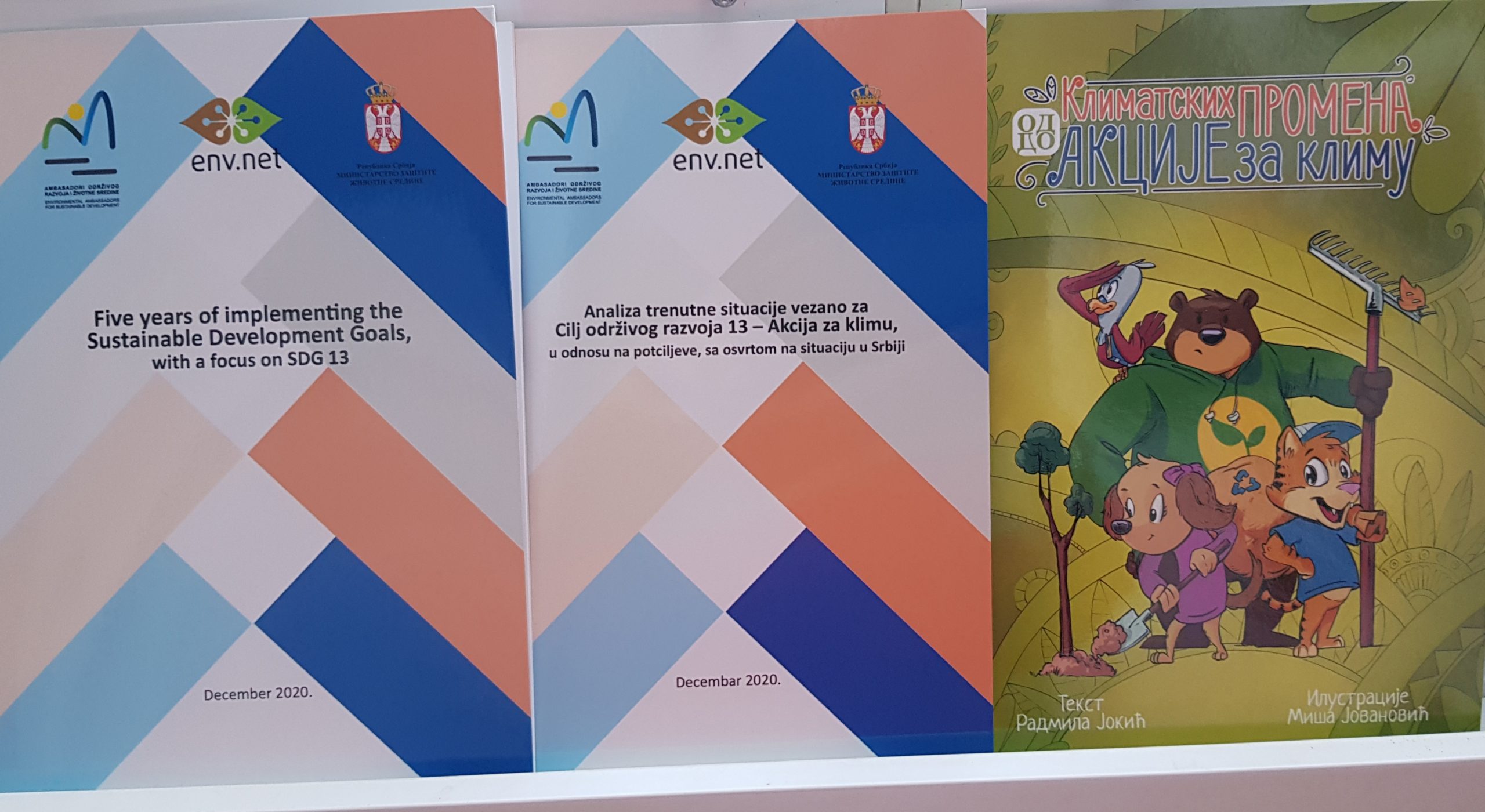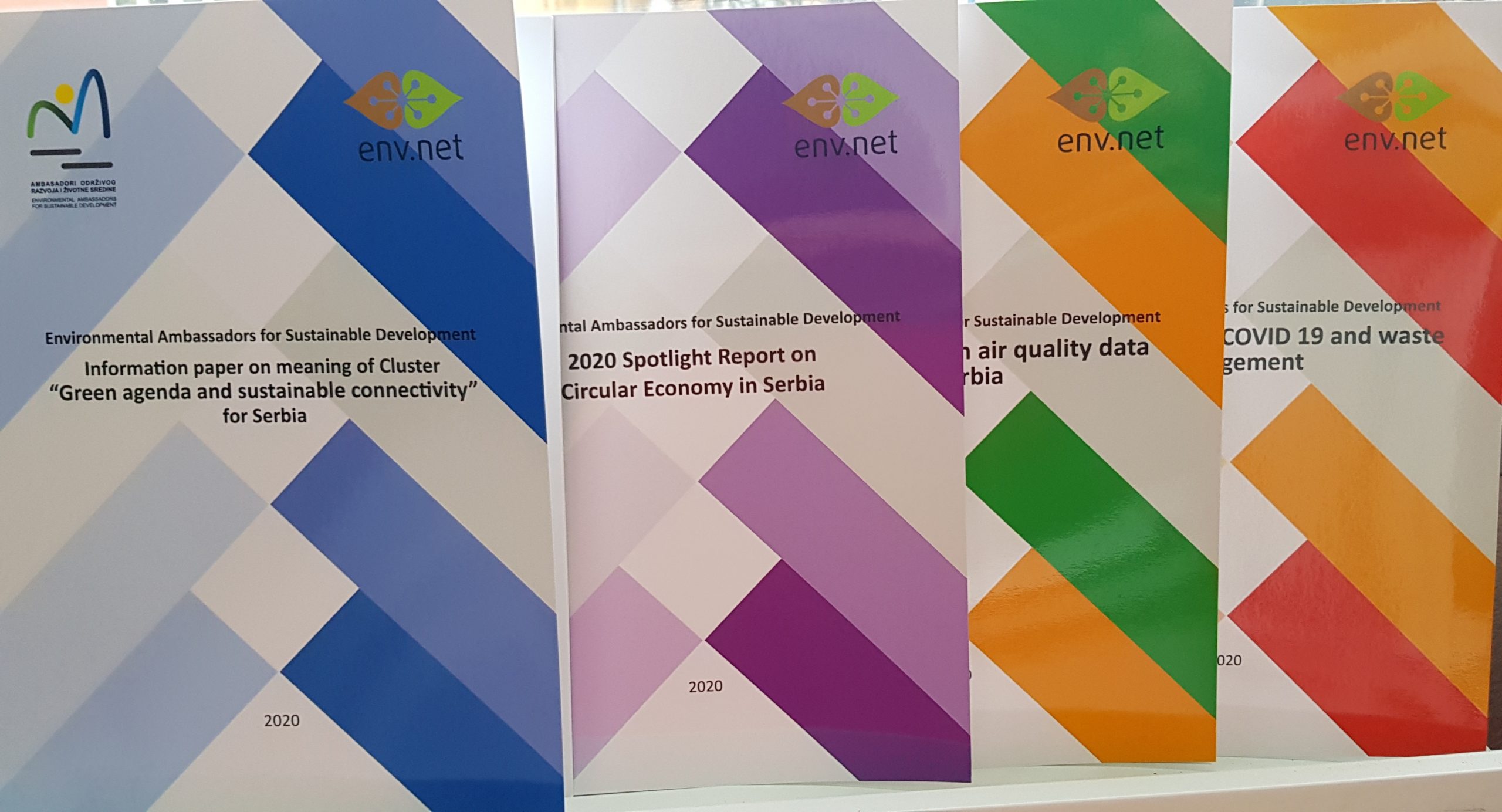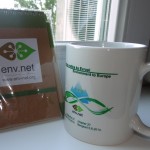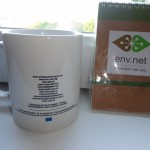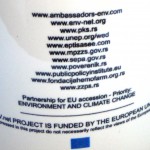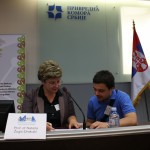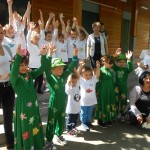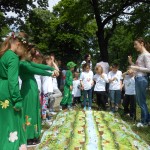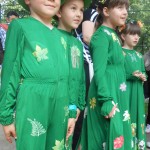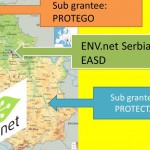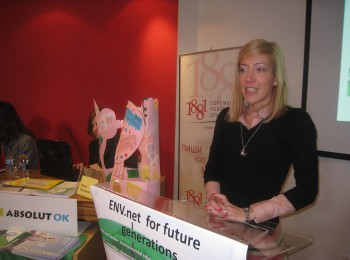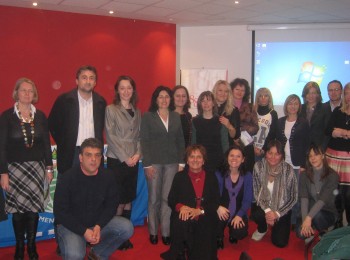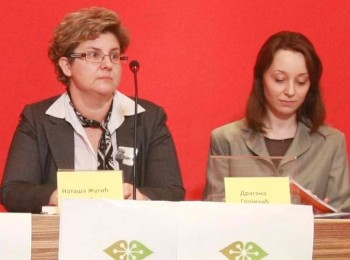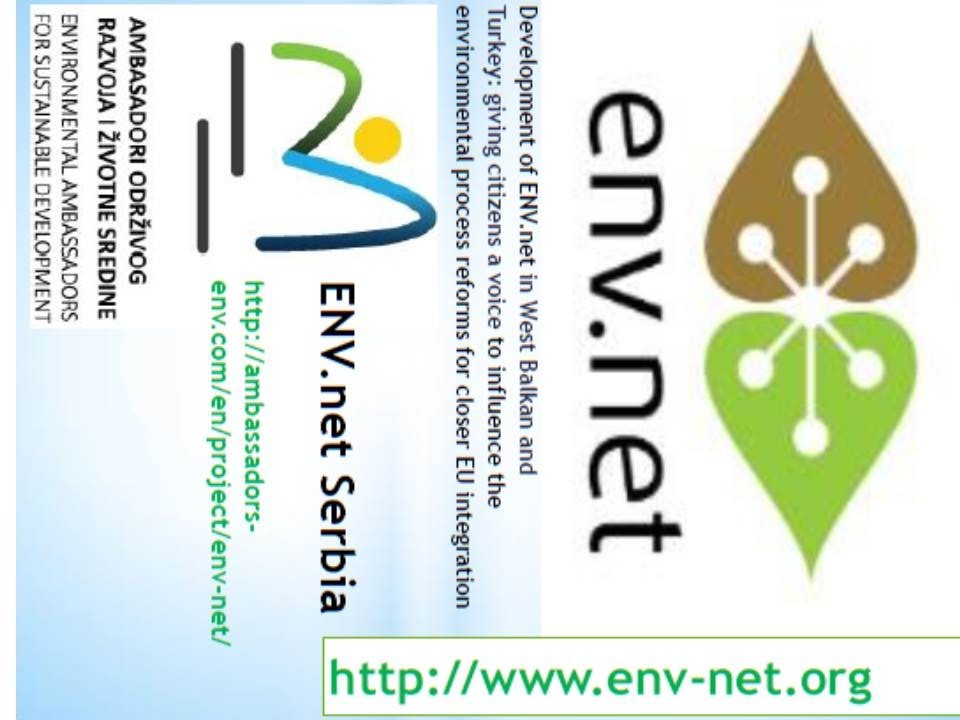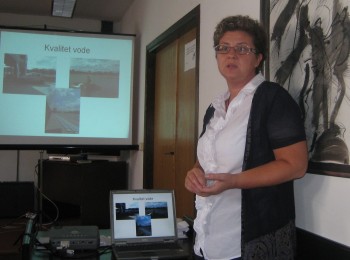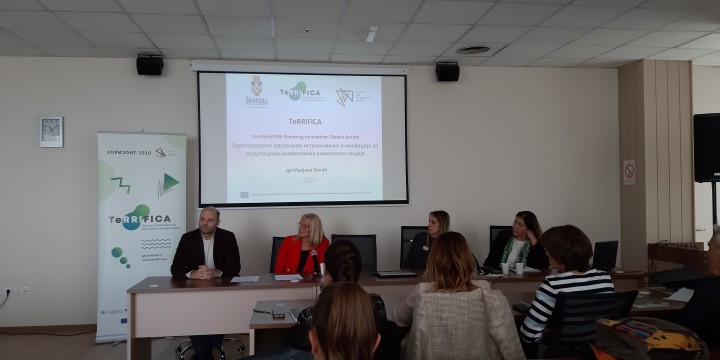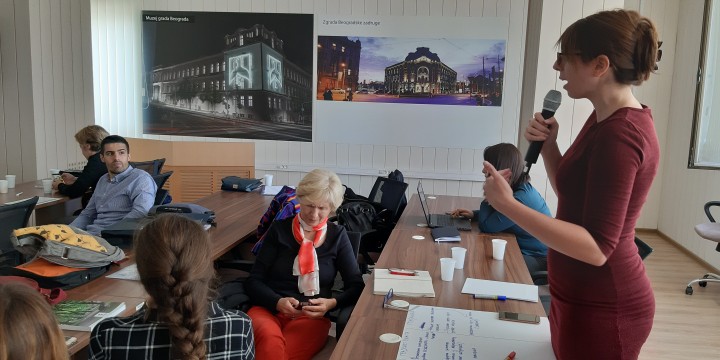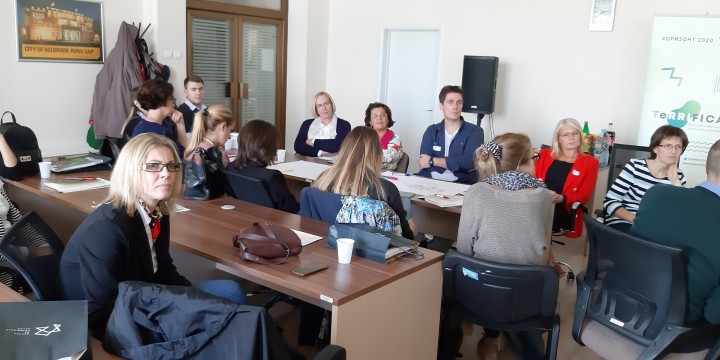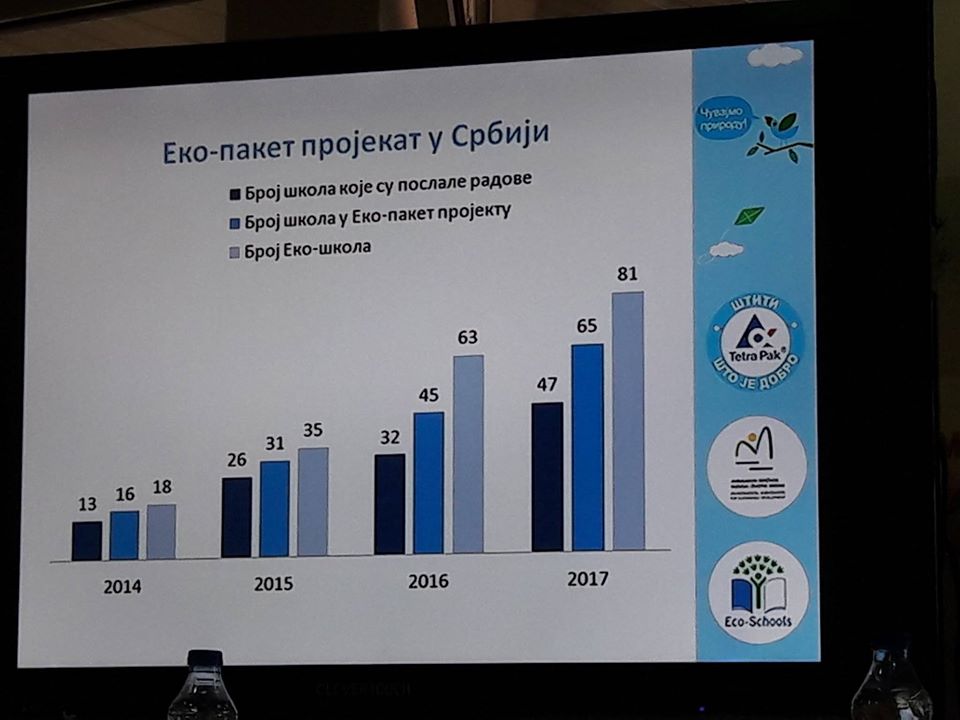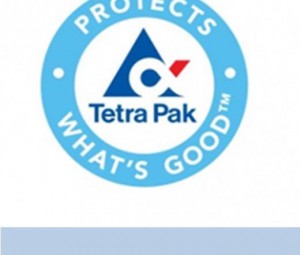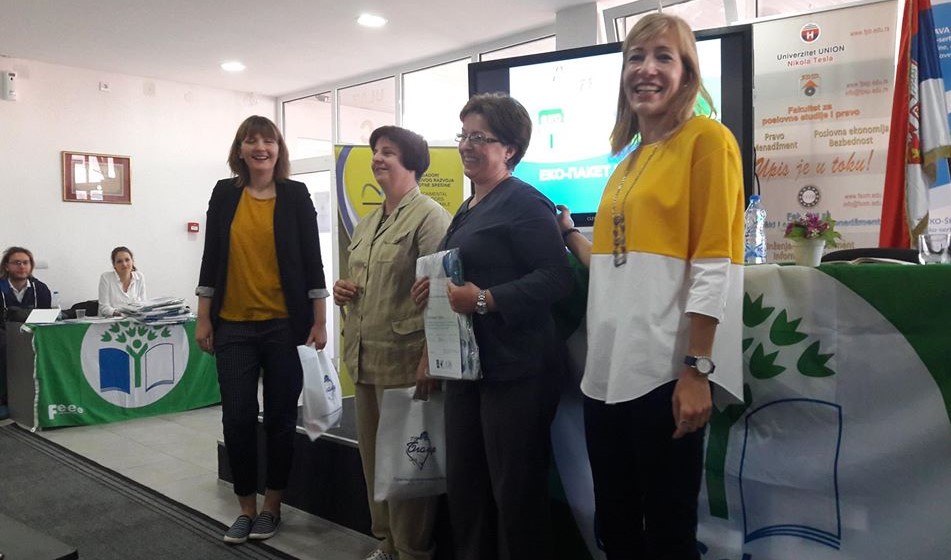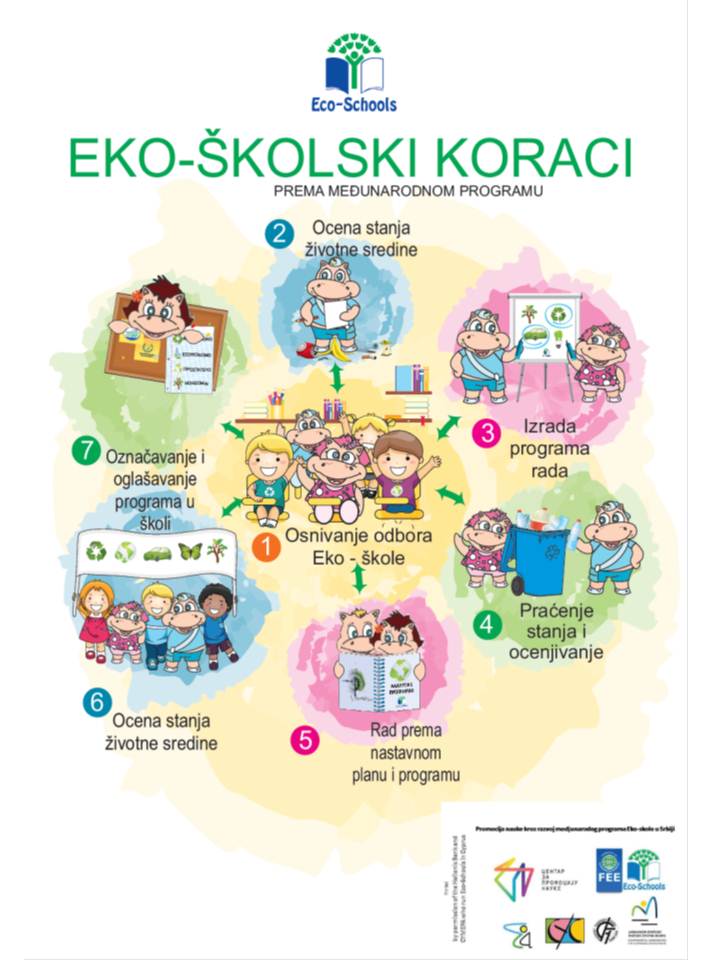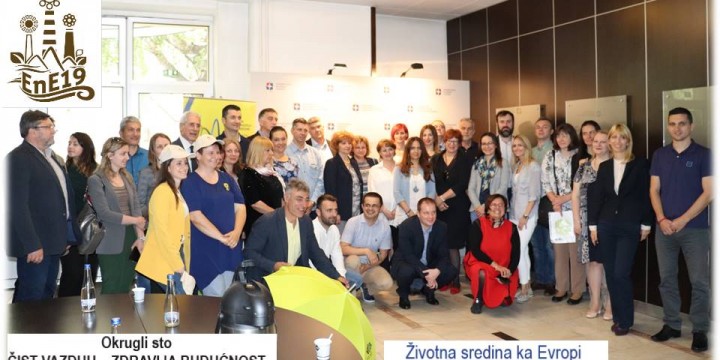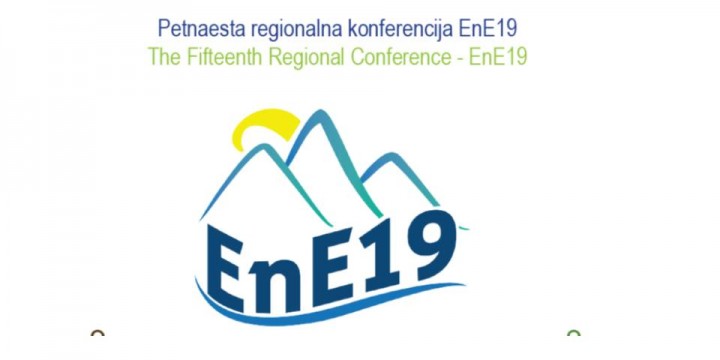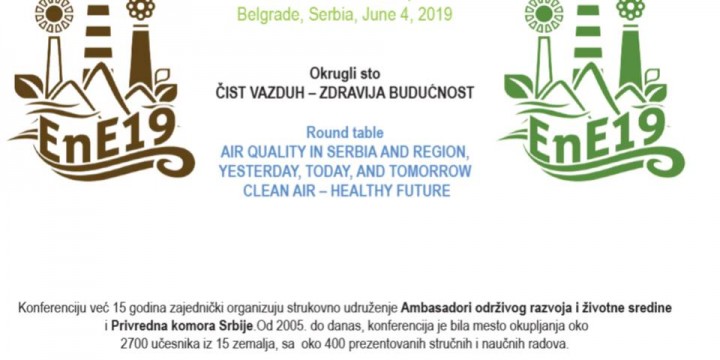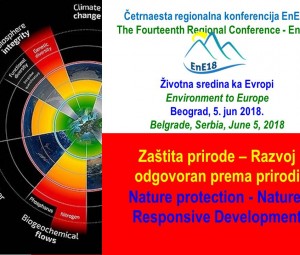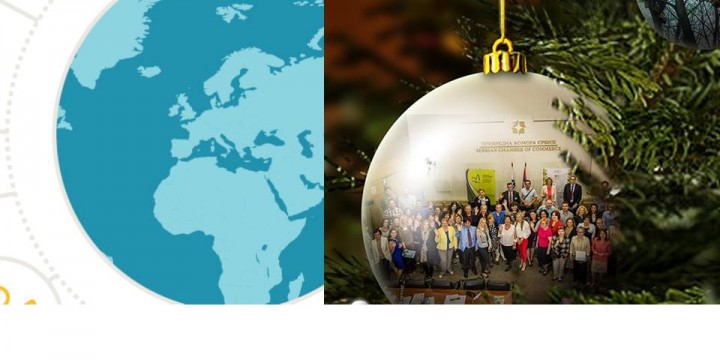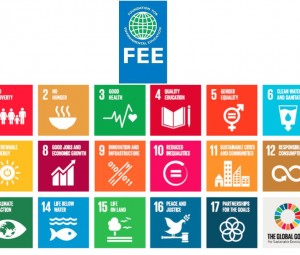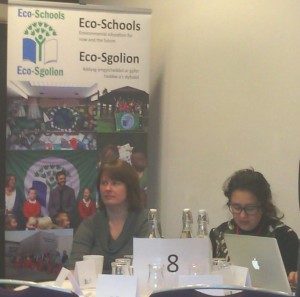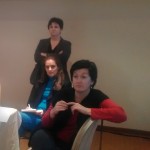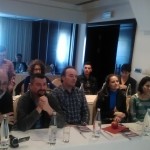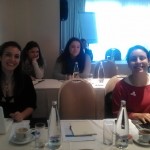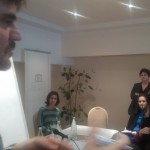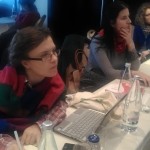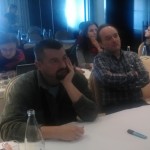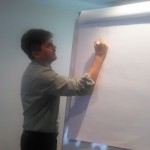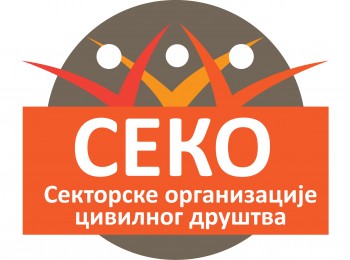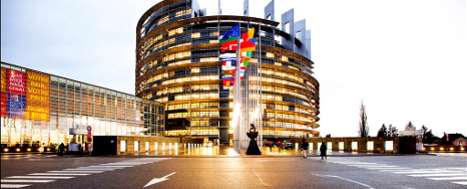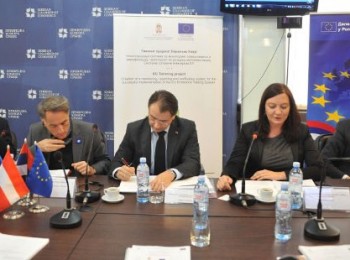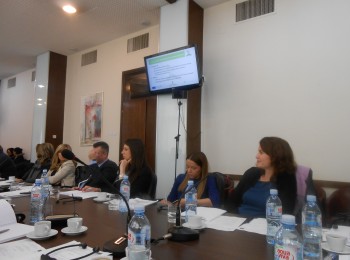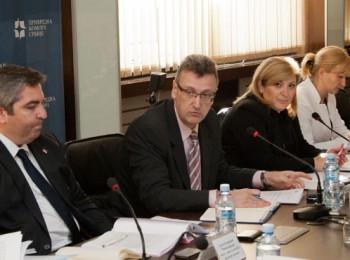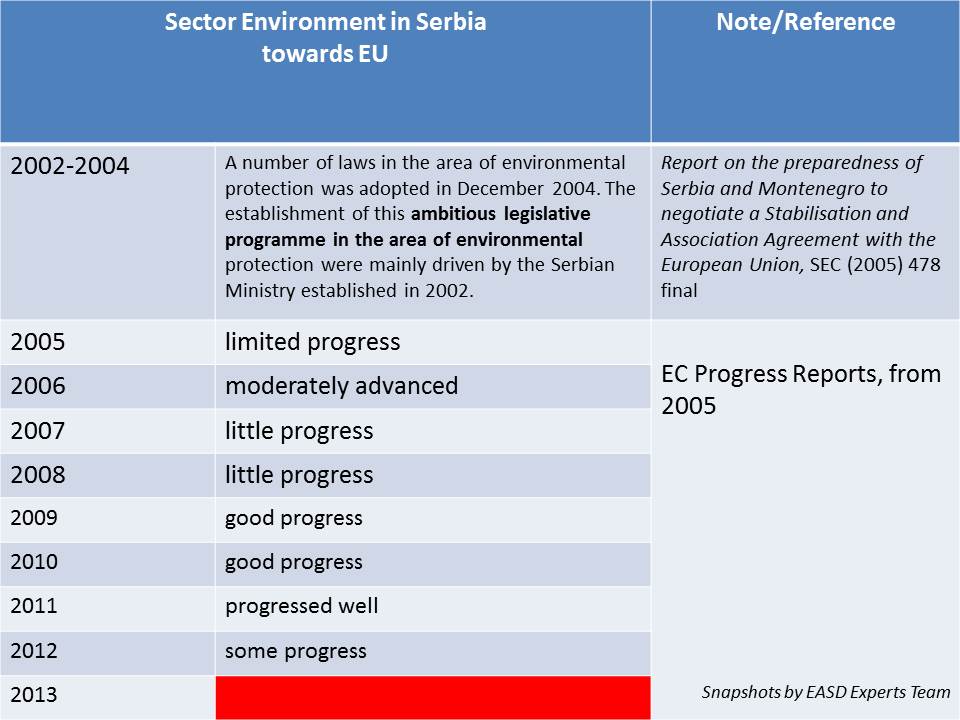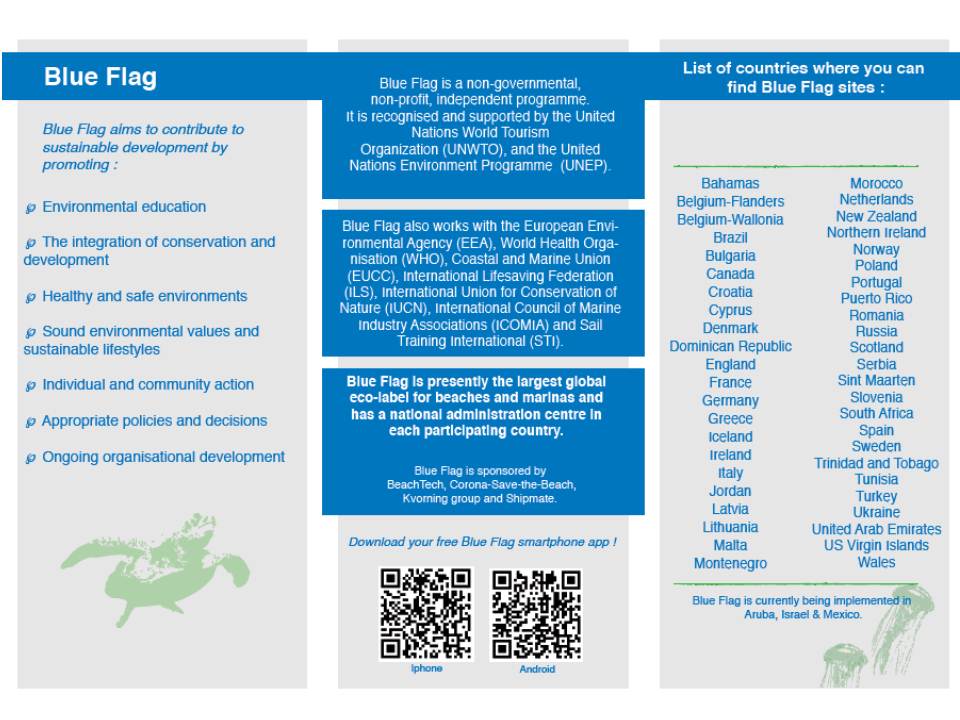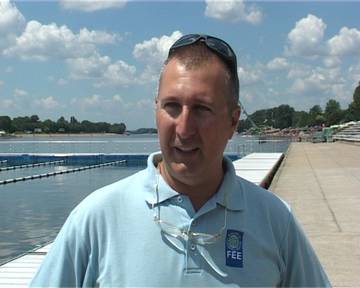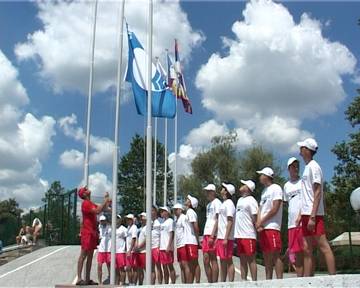ECO-SYSTEM AND “GREEN CHAIR”: PROJECT “CITIES READY FOR CLIMATE CHANGE”
Consultations and a workshop for the preparation of the proposal of the Strategic Plan of the “Green Chair” network were organized within the third cycle of the EKO-SYSTEM support program “Cities Ready for Climate Change”, in October 2023. The lead partner is the Centre for Modern Skills, and the partners are the Aarhus Centre Novi Sad, the BFPE Foundation for Responsible Society and the Environmental Ambassadors for Sustainable Development. The project aimed to improve further the work and strengthen the “Green Chair” network. The topic of the project is adaptation to climate change at the local level.
During the implementation of the project, another activity was consultations held with representatives of local communities: Kruševac, Pirot, Požega, Sremska Mitrovica and Subotica, to encourage advocacy at the local level, related to climate change.
The representative of the Environmental Ambassadors for Sustainable Development, Aleksandra Mladenovic, supported the preparation of a model of a local initiative for the city of Kruševac, which contains measures to mitigate climate change at the local level. As part of the mentoring work, two online thematic meetings were held, with the team for drafting a local initiative. It includes the concept of measures that will be proposed to the local self-government unit. The mentoring work resulted in greater cohesion of the local team, strengthening mutual communication and reaching an agreement on joint climate action at the local level.
Proposal of measures and recommendations for adaptation to climate change and mitigation of the impact of climate change, for local self-government units
General Measures
1. Include a set of measures and recommendations for adaptation to climate change in the development of spatial planning and strategic documents, Development Plans, and Local Environmental Action Plans.
2. Building, strengthening and improving capacities at the municipal level to a) adapt to climate change to introduce adequate measures into policies and decision-making processes at the local level, b) plan and implementation of climate policies, as well as modeling GHG emissions at the local level, and c) data collection, analysis and use (with a focus on the use of GIS), especially those related to river basins, flood maps, water source protection zones, erosion risk zones, etc.
3. Organizing trainings and seminars on available funds for the implementation of projects directly related to climate change (renewable sources, energy efficiency), joint training and seminars to strengthen institutional capacities and improve multisectoral cooperation.
4. Preparation of educational manuals to improve the understanding of the vulnerability of certain sectors to the impacts of climate change and to build resilience and adaptive capacity of the local community.
5. In cooperation with higher levels of government, strengthen the capacities (technical and human) of protection and rescue services at the local level to undertake organized and effective protection and rescue measures.
6. Establishment of an early warning system for the management of extreme climatic events (for all types of climate hazards: floods, droughts, landslides, forest fires, etc.).
7. Use of digital technologies to monitor extreme climatological situations (e.g. drone monitoring, real-time monitoring, etc.).
8. Establish a single database on droughts, floods and landslides and their damage.
9. Adapt Local Fire Protection Plans in the context of adaptation to climate change; ensure reserve amounts of water, by building or installing water tanks, etc. for effective fire protection (especially in open spaces).
Measures by sector
– Agriculture
1. To improve the knowledge of farmers about the impacts of climate change and to introduce them to examples of good practice from the countries of the European Union, but also from the surrounding countries.
2. In organized agricultural production, establish a hail protection system.
3. Improve irrigation infrastructure and ensure sufficient water for irrigation of arable land, in particular for agricultural production that takes place outdoors and is therefore exposed to weather conditions.
4. Receive and capsulate large waters when they exist and make them available in conditions of need through the construction of artificial reservoirs, which, in addition to the production of electricity, also create conditions for the development of tourism, provide flood protection of the downstream area and provides water for irrigation.
5. Implement measures to improve cooling in agriculture (construction of shelter from the sun, adequate accommodation, installation of fans and sprinklers).
6. Subsidize small agricultural producers, especially in the context of reduced incomes and agricultural yields during dry periods.
7. In agriculture, encourage the use of adequate varieties that are more tolerant to heat and drought, change crop patterns, target land management practices, farm structure, and adaptive capacity of farmers.
8. Application of measures aimed at preventing plant diseases, soil heating, etc.
9. Create the conditions and strengthen the awareness of farmers for adequate management of agricultural waste to reduce emissions from methane.
– Forestry
1. Maximize illegal logging control and implement forest health protection measures (occurrence of pathogenic fungi, occurrence of forest fires, define measures in response to snowstorms, wind gusts, frosts, etc.).
2. Intensify afforestation in landslide-prone areas and land erosion to reduce the risk of new landslides.
3. Establish comprehensive monitoring of areas at risk of erosion and landslides, with the preparation of plans and maps and action plans for prevention and control over their implementation.
– Civil engineering
1. To reduce the risk of landslides, establish continuous monitoring and documentation of illegal and unplanned construction of residential and other buildings and consistently implement regulations governing construction conditions.
– Water management
1. Plan the construction of a system for connection to the sewage network and wastewater treatment plants
2. Provide for continued investment in preventive protection and rescue measures, as well as full coordination with all actors having an impact on floods.
3. Procurement of adequate material and technical means and equipment is important for the provision and organization of all measures that affect the degree of vulnerability of people and material goods from floods.
4. To ensure timely and complete information to citizens about all measures and actions taken by the municipality to reduce the risk of floods, as well as to raise awareness of citizens about the possible consequences of floods.
5. Establishment of uniform inter-municipal and regional flood protection measures and a unified system of warning and notifying the competent structures of the upcoming danger, as well as the need to build a common (single) management system for hydropower facilities that have a regional character.
– Nature protection
1. Application of Nature Based Solutions, such as the maintenance and restoration of natural aquatic ecosystems (e.g. rivers, connecting river channels and meanders), afforestation, restoration and maintenance of grasslands, buffer zones, adequate land management, etc., because nature-based measures are more effective than technical infrastructure for flood protection (embankments, canals, etc.), both in environmental and economic terms.
– Waste management
1. Implement measures to reduce the waste that is deposited and adequate collection of municipal waste (collection networks in rural areas, construction of recycling yards, procurement of specialized equipment for waste collection, as well as activities to educate and raise awareness among the local population about the importance of this topic).
-Gender equality and human rights
1. At the local level, work on linking gender equality and climate change, as well as the realization of equal rights for all, especially vulnerable groups (e.g., youth, Roma, women, persons with special needs…), by implementing climate change mitigation measures.
4th Meeting of the Intersessional Process for Considering SAICM and the Sound Management of Chemicals and Waste Beyond 2020, Bucharest 2022
EASD is participating at the fourth session of the Intersessional Process for Considering the Strategic Approach to International Chemicals Management (SAICM) and the Sound Management of Chemicals and Waste Beyond 2020 (IP4) in Bucharest , August/September 2022. From Serbia, beside Environmental Ambassadors for Sustainable Development (EASD), NGO Safer Chemicals Alternative – ALHem also participated. A summary report of IP4 by ENB which includes also a brief summary of SAICM’s history as well as of the history of the intersessional process.
As the meeting result Co-Chairs’ consolidated text is achieved. achievement, and resume it in early 2023 at a time and venue to be set by the Bureau in consultation with relevant stakeholders.
The UN General Assembly recently adopted a resolution establishing access to a clean, healthy and sustainable environment, a universal human right. At the same time, recent scientific evidence shows that the global threat of plastic and chemical production has exceeded the “planetary boundaries” for chemical pollution. In addition, the global chemical industry is projected to double by 2030, with rapid growth in emerging economies.
The CEE Region recognizes the need for greater cooperation among stakeholders aiming at strengthening the capacities of developing countries and countries with economies in transition for integrated management and promoting the adequate transfer of cleaner and safer technology. Moreover, great deal of attention should be dedicated to raising awareness of chemicals and waste issues among the responsible institutions, agencies, with improvement of the multi-sectorial and multi-stakeholder cooperation.
EASD position (within IPEN umbrella) is to believe that the SAICM is key to advancing the sound management of chemicals and waste considering human health and the environment. Some of important issues pointed out by IPEN include:
– SAICM is the only instrument we have today to address most chemicals and waste but its goals were not met although progress was made. SAICM should strengthen its open, inclusive, participatory and transparent structure which should be multi-sectoral and multi-stakeholder; From our perspective we need an agreement for a strong SAICM-Beyond-2020 Framework that goes beyond the Dubai Declaration and secures ambitious targets for prevention and reduction of harmful chemicals and waste globally bringing about real change.
– The science-to-policy panel should be a tool to raise awareness about the existing scientific knowledge and allow it to take action on emerging issues and issues of concern that were already agreed upon in SAICM; Also, should also have inclusive participation, allow the consideration of different forms of knowledge including from indigenous peoples, and take into account gender-specific dimensions;
– The scope shall include chemicals and all waste throughout their lifecycle.
– That objectives for the industry involvement and other financial commitments are reflected in targets, indicators, and milestones and that monitoring and reporting instruments track progress on financial objectives of the beyond 2020 instrument.
– The framework must also be accompanied by new and additional, adequate, sustainable and predictable funding accessible to all relevant stakeholders to address chemicals and waste issues. The establishment of a funding mechanism following the model of the Quick Start Programme.
The fourth session of the Intersessional Process for Considering the Strategic Approach to International Chemicals Management (SAICM) and the Sound Management of Chemicals and Waste Beyond 2020 (IP4) focused on:
-targets for the post-2020 instrument; -national focal points; -national implementation plans;-how the instrument should deal with issues of concern;-private sector involvement in financing chemicals and waste management; and -the relationship between the instrument and the science-policy panel for chemicals and waste (SPP) mandated -by the fifth session of the UN Environment Assembly (UNEA5).a vision and principles for the instrument;
-identifying targets for the instrument; -how to choose “issues of concern” that would be targeted by the instrument for focused attention and concerted action;-multi-sectoral partnerships;-funding for the secretariat; and -a proposal for a globally coordinated levy on chemical feedstocks to feed a new international fund on chemicals and waste;
– whether, and how, to refer to the new human right to a healthy environment under the instrument’s section on principles; – a possible measurability structure for indicators; – a possible stocktaking mechanism and online tool; -participation in the proposed governing body—the conference—by representatives from the environment, health, labor and agriculture sectors involved in chemical management and safety issues; and – a proposal for a way forward on how to handle existing SAICM issues of concern under the new instrument.
To note that EASD participate and follow SAICM WG on Governance and Mechanisms to support Implementation (from October 2020, lead to IP4 ).
Delegates considered targets in the compilation of draft recommendations for a new instrument as well as new proposals for targets. They agreed to replace the long list of targets with a more limited set of priority targets, grouped under specific strategic objectives. Discussion centered around which targets to keep, which newly proposed targets to include, and which targets might be merged together. See also a table comparing the SAICM Overarching Policy Strategy, SAICM/IP.4/2/Rev.1 “Compilation of recommendations regarding the Strategic Approach and the sound management of chemicals and waste beyond 2020” and the Outcomes of the Virtual Working Groups
On vision, delegates replaced the proposed phrases in the compilation text with three new ones developed by an informal group:
- “Chemical safety for all”;
- “A toxics free planet. Advancing chemicals and waste safety for a healthy future”; and
- “Healthy Planet and People: Making Our Future Chemical and Waste Safe.”
(to note, EASD support Call to action for a tomorrow without toxics )
We must continue working together towards a sound management of chemicals and waste throughout their life cycle, in order to avoid or minimize adverse impacts on human health and the environment!
Call to action for a tomorrow without toxics
Sign the Call to Action here:
https://docs.google.com/forms/d/e/1FAIpQLSecU8_1QRK983bsB1s92c0sHyVBv
adDWW2dW–T_46_JiWjgg/viewform
Urgent call for a strong SAICM-Beyond-2020-Framework ensuring sound chemicals and waste management!
Increasing chemical production, use of harmful chemicals, pollution, and waste are turning into a third planetary crisis[1], beside the climate and biodiversity crises, and at the same time exacerbating them. There is an urgent need for solution-focused actions along the whole lifecycle of chemicals and waste, addressing the threats to human health and the environment – from the enormous use of chemicals, poor chemicals and waste management, to the ever-increasing production and raw material extraction. The undersigned organizations stand together in urgently calling
on governments, industry, and other stakeholders to work towards a tomorrow without toxics. We urge them to actively reduce their chemical footprint and make prevention, reduction, and sound management of chemicals and waste a priority issue.
The current levels of chemicals used in industrial processes, agriculture and daily life products massively expose people and ecosystems to harmful substances.
Ubiquitous, excessive and often uncontrolled use of chemicals, their improper storage and disposal, and accidents, as well as the amount of waste in general and in particular mismanaged waste lead to harmful substances entering the environment, food chains, and human bodies. They poison air, soil and water, harm wildlife and cause biodiversity loss. Exposure to hazardous chemicals produces reproductive and neurological disorders, causes intergenerational effects, and the loss of livelihoods and food systems, among other things. The burdens fall disproportionately on the most financially oppressed, vulnerable and marginalized groups, such as Indigenous
Communities, people in the Global South, workers in industry and agriculture, women and children. This makes chemicals and waste management a cross-cutting issue.
The Strategic Approach to International Chemicals Management (SAICM) and the Dubai Declaration, adopted in 2006 by the First International Conference on Chemicals Management (ICCM1), aimed to achieve sound management of chemicals and waste throughout their life cycle by 2020.[2] Now, at the beginning of the year 2022, we see an even more urgent need for action. SAICM has identified important issues and created a multi-sector platform and multi-stakeholder process for action, involving governments, civil society, businesses and academics. However, the overall objective has not been achieved and progress made is insufficient and mainly limited to information collection, while only a few concrete risk reduction measures have been undertaken. Adverse impacts on human health and the environment from raw material extraction, chemical production, use and disposal continue.
There is no time to waste.
We need an agreement for a strong SAICM-Beyond-2020-Framework that goes beyond the Dubai Declaration on International Chemicals Management[3] and secures ambitious reduction and prevention of harmful chemicals and waste globally, bringing about real change, including the implementation of safe alternatives. Our vision is a world where chemicals and wastes are no longer a source of harm and where all people live in safe and healthy environments, free from toxic threats to ecosystems and to future generations. We call upon all stakeholders to commit to this goal and to increase engagement, expressing a concrete will to end the poisoning of our world. Put a
SAICM-Beyond-2020-Framework urgently into practice as follows:
● Recognize and implement the precautionary and sustainability principles as basic principles and rationale behind all measures. Follow the hierarchy of prevention, elimination and minimization of hazardous substances.
● Include the possibility to stipulate or initiate binding elements for chemicals and waste management throughout the whole lifecycle, including raw material extraction, production, use and disposal of chemicals.
● Set ambitious targets and milestones. Make national action plans binding for all SAICM stakeholders, which particularly promote implementation and monitoring. Include concrete activities to solve the Issues of Concern in SAICM national action plans as well as education and awareness raising measures. Ensure that groups of related chemicals are addressed in the framework and in related action plans
● Establish mechanisms for implementation and progress reporting, and independent monitoring, as well as mechanisms for compliance.
● Realize global implementation on all levels (i.e. local, national, regional and international levels) and ensure this through national action plans. Make a SAICM-Beyond-2020-Framework compatible with other global treaties
including a future legally binding Plastics Treaty[4] or a future international regulation on pesticides[5].
● Secure the multistakeholder and multisectoral character of SAICM. Ensure that the negotiation process is carried out in a way that guarantees equal and fair participation of all stakeholders and right holders, as well as the
possibility to bring in contributions, especially from the civil society.
● Guarantee solid, sustainable, and reliable financing by the internalization of external costs, according to the Polluter Pays Principle. This could be achieved through a coordinated tax on chemical feedstocks, levied by the
national governments where the chemicals are produced[6], ensuring and prioritizing the support for developing and emerging countries. Especially civil society organizations, Indigenous Communities, and science, including citizen science, should be eligible for funding. Further options to implement the Polluter Pays Principle are to be explored and implemented.
● Make sure that a SAICM-Beyond-2020 addresses the identified shortcomings of the predecessor framework and in particular, that solutions for all identified Issues of Concern (IoCs) are developed and new IoCs included when they are needed. Current IoCs must be kept until resolved[7]. This includes e.g. a global phase-out of highly hazardous pesticides (HHPs) and their replacement with agroecology in line with ICCM4 resolution, measures to reduce endocrine disrupting chemicals (EDC) exposure for humans and the environment, and transparency and traceability for chemicals in products.
● Guarantee globally equal safety levels for everyone and everywhere. States must ensure the protection of people and the environment through laws and regulations that hold producers accountable along the entire supply chain
and throughout the whole lifecycle. Eliminate unethical and unacceptable double standards.
● Support the approach of a binding Global Minimum Transparency Standard[8] as a first step for chemicals in products and the establishment of labeling according to UNEP SCP guidelines[9]. This can ensure transparency and
traceability, which are, together with the right to know, key requirements for a safe circular economy globally. It further helps to eliminate double standards and dumping of products in countries with less ambitious chemicals legislation, and to guarantee an equal level of safety for everyone everywhere.
● Ensure sensitivity to the different exposition and vulnerability of people and groups of people to hazardous substances, depending on their area of residence, occupation, social and economic status, age, and gender. Consider
that children are particularly vulnerable to hazardous substances and must be protected from being born pre-polluted.
● Better protect women from hazardous chemicals, by implementing gender responsive policies, mainstreaming gender-equality and collecting gender disaggregated data. Recognize and encourage the leadership role of women in society, politics and science, and also in a SAICM-Beyond-2020-Framework. Consider that women are more susceptible to harmful chemicals than men and have different windows of vulnerability, e.g. during pregnancy.
They are also exposed differently to toxic chemicals due to their gender roles.
● Recognize the principles and values of the universal human rights[10]. Support all right holders, according to the respective international resolutions and declarations[11].
● Recognize the principles of the Rio-Declaration on Environment and Development and the principles of the Agenda 2030, as basic principles.
● Acknowledge the role of chemicals and waste in the biodiversity and climate crises and take action to address these impacts through decreased chemical production, use and disposal, phase out of harmful substances and
implementation of safe and non-chemical alternatives
Urgent call for a strong SAICM-Beyond-2020-Framework ensuring sound chemicals and waste management!
EASD more focused to activities against plastic pollution
Environmental Ambassadors for Sustainable Development (EASD) started in 2020 with more focused engagement and activities in the thematic issue of plastic pollution. We found important UNEP initiative to beat plastic pollution , as well as designing out plastic pollution .
EASD started with analysis, participation in global studies and relevant national/local surveys and initiatives related plastic in products and in waste.
EASD activities include activities in : Science and Research (for better Governance and regulation) – A circular economy for plastic, Education and learning against plastic pollution, Promotion of sustainable travel against plastic pollution, Promotion of clean beach against plastic pollution, as well as Processes towards global plastic treaty and EU accession, participation and monitoring.
Further, EASD is following development of an international legally binding agreement . See resolution at the resumed fifth session of the 2022 United Nations Environment Assembly (UNEA-5.2) in Nairobi to end plastic pollution and forge an international legally binding agreement by 2024. EASD special attention is to harmonize global process against plastic pollution with EU accession process at national and regional level. To note that Serbia is candidate country for EU membership and Cluster 4 was opened for negotiation in December 2021. See also EASD work in theme EU accession and enlargement. In this period, EC priority is European Green Deal with action on plastics to tackle plastic pollution and marine litter, and to accelerate the transition to a circular plastics economy . For Western Balkan, Action Plan for the Implementation of the Sofia Declaration on the Green Agenda for the Western Balkans 2021-2030 (GAWB) is approved.
IPEN global plastics monitoring project
The aim of the IPEN global plastics monitoring project is to raise awareness locally and globally about hazardous chemicals in recycled plastics used for consumer products. The project targeted recycled plastic pellets of high-density polyethylene (HDPE) sold from small-scale, local operations, since this is one of the most commonly used material for consumer products. These have been analyzed for UV stabilizers, Decabromodiphenyl ether (deca BDE) and PCBs.
Environmental Ambassadors for Sustainable Development participated in the project as IPEN participated organization. The recycling facility EASD used as project site is situated in north-west Serbia, and there are app. 75 employees. The facility was founded 15-16 years ago. 75% of products are for the export, to the Central European Countries (Poland, Czech Republic…). Other 25% is sold to the domestic plastic producers (placed around Serbia), which use these recycled plastic pellets to produce plastic products, but not for food storage.
There are several steps performed to produce recycled plastic pellet, from yield small pieces of plastic (flakes or fragments) to the pellet that is using in next steps of production cycle.
All secondary raw material is used in the recycling process (“zero waste” at the end of the process). They use plastic breakage and waste from its production to make plastic buckets for the construction sector, black colored.
The input plastic is coming from unformal secondary raw collectors, but the large number are also imported.
The samples of plastic pellets were used from the facility and sent to IPEN to be analyzed. The samples were analyzed at the University of Chemistry and Technology Prague in the Czech Republic. More at …..
The results are shown in the study: Widespread chemical contamination of recycled plastic pellets globally.
Presentations:
Widespread chemical contamination of recycled plastic pellets globally
Global plastic pellet samplings – Results and briefing
Press Release:
Further promotion of results:
April 28, 2022 – Participating at Local Round Table in Perlez, municipality Zrenjanin, presenting issues of toxic additives in plastics pellets and IPEN study, as well as capturing synergies between plastic pollution (and with decarbonization and climate change. About 10 people from this small town participated.
Activities of awareness raising in Serbia are posted on site in Serbian language.
“Citizen science” – definition in 2021 UNECE Document
Environmental Ambassadors for Sustainable Development (Environmental Ambassadors, EASD) is a non-for-profit professional association focusing, among other, work on research and science (professional and participant science/citizen science) promotion. EASD is the member of European Citizen Science Association.
With interest we are following the seventh session of the Meeting of the Parties to the Convention on Access to Information, Public Participation in Decision-making and Access to Justice in Environmental Matters (Aarhus Convention) taking place in Palais des Nations, Geneva from 18 to 21 October 2021. A number of substantive decisions are expected to be adopted at the session that will guide the activities of the Convention in the next intersessional period.
Among documents is document ECE/MP.PP/2021/20/Add.1. There, a number of definitions took our attention; some of them are: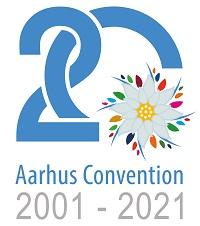
- “Citizen science”, means a form of open collaboration in which members of the public participate voluntarily in the scientific process, engineering research or environmental monitoring in various ways;
- “Citizen science observatories”, refers to community-based environmental monitoring and information systems that invite individuals to share observations, typically via mobile telephone or the web;
- “Research data”, means documents in a digital form, other than scientific publications, which are collected or produced in the course of scientific research activities and are used as evidence in the research process, or are commonly accepted in the research community as necessary to validate research findings and results;
- “Citizen science data”, means data collected by members of the public, often in collaboration with or under the direction of professional scientists, nongovernmental organizations and scientific institutions;
- “Citizen-generated data”, which means data produced through citizen sensing, citizen science and other forms of civic monitoring that share the common denominator that the data collection process is primarily carried out by volunteer individuals actively joining the initiative;
Environmental Communication: Media Archive Reports as a Participant Science Tool
EASD presented on August 3, 2021, research paper Environmental Communication: Media Archive Reports as a Participant Science Tool (Authors are A.Mihajlov, A.Mladenovic, F.Jovanovic) at 6th International Conference on Communication and Management (ICCM2021), hosted and organized by Communication Institute of Greece.
By sharing experience, this paper justifies environmental communication through the media archive reports as participant science tool, considering that journalists/media are representing citizens (with common interests). In the case of Serbia, illustrative justification that media archive reports could be used as participative tool to supplement official observation and monitoring, is presented, showing that the same trends of citizens/journalist’s attention to environment and environmental performance and progress (in the European Union accession process) in Serbia. In timeline, when sector environment has better performance, it is bigger interest of citizens/journalists/media to environmental issues.
This article benefited from the European Union funded project “ENV.Net Factoring the Environmental Portfolio for WB and Turkey in the EU Policy Agenda” (2017/394-372). The views expressed in this paper do not necessarily reflect the views of the European Commission. Also, authors would like to express gratitude to Media archive Ebart, Belgrade, Serbia for contribution in data collecting. Data used in this paper were gathered through the research on nexus media-environmental issues in Serbia, which was based on initial idea jointly developed by respective journalist Velimir Ćurgus Kazimir (1948-2018), Media Archive Ebart founder and this paper co-author Andjelka Mihajlov, co-founder of Environmental Ambassadors for Sustainable Development.
By this presentation Prof Mihajlov, as paper presenter, also informed and inspired climate actions in contribution to the European Climate Pact , empowering citizens to shape a greener Europe…..participants of this Conference was great ‘communication network” for this. To note that in July 2021 Prof Andjelka Mihajlov, Environmental Ambassador for Sustainable Development, was acknowledged by European Commission DG Clima as European Climate Pact Ambassador , among others for Green skills .
Ref.: Environmental Communication: Media Archive Reports as a Participant Science Tool (Authors: A.Mihajlov, A.Mladenovic, F.Jovanovic) , Abstract Book “Communicating in a ‘Modern’ Word” , 6th International Conference on Communication and Management – ICCM 2021, page 30, Edited by Communication Institute of Greece (COMinG), ISBN: 978-618-81861-9-4 (2021)
ENV.net
ENV.net project consists of ENV.net 1/2 (2012-2016) and ENV.net 3 (2017-2020) projects. EC supported
ENV.net 1/2: ENV.net – Development of ENV.net in West Balkan and Turkey: giving citizens a voice to influence the environmental process reforms for closer EU integration, EuropeAid/132438/C/
ACT/Multi – 2012/306-642 and 2014/351-610; Partners for project implementation are: Puntosud , EASD , Co-PLAN , EEB – European Environmental Bureau, ATRC and TEMA . The project builds on the experience of an EU-funded project, namely the Environment Forum, implemented in the period 2009-2012, aiming at developing capacities of environmental NGOs to establish a constructive dialogue with national authorities. The present project strategy has been designed to achieve a greater commitment and capacity of a group of CSOs coming from Environment Forum experience and which have agreed on the creation of a new network, the ENV.net, to support the civil activism, give citizens a voice and influence the public reform processes in the approximation to the environment acquis. With the view to further enhance their capacities to work with CSOs and to share experience with other European countries, EEB has accepted to participate and to share its experience. Project objective – Greater commitment and capacity of the ENV.net to give citizens a voice and influence public sector reform processes in the environment sector through analysis, monitoring and advocacy. As one of the outcome National ENV.net networks (to complement Regional ENV.net network) were established; established ENV.net Network in Serbia have 54 organizations (multistakeholders).
ENV.net3: “ENV-net factoring the environmental portfolio for Western Balkans and Turkey in the EU Policy Agenda” – EuropeAid/154870/ACT/Multi ; EASD (Serbia) partners for project implementation are: 4X4X4 Balkan Bridges from North Macedonia, European Environmental Bureau from Belgium, Advocacy Training and Resource Center, from Kosovo*, Green Home, from Montenegro, Lir Evolution, from Bosnia and Herzegovina, TEMA – the Turkish Foundation for Combating Soil Erosion, for Reforestation and Protection of Natural Habitats, from Turkey and Foundation Punto,Sud, from Italy. The project contributes to the improvement of environmental policy-making and implementation in compliance with the EU standards. To this end, the network foresees to contribute to both improved and intensified inter-action among actors (including environmental CSOs, media and policy-makers) and an overall more enabling technical and financial environment where these actors operate. The action sets out to strengthen the profile of ENV.net as the leading network and bridging actor in environmental policy-influencing in the WB and Turkey region (vis-à-vis EU). Further, it foresees introducing and initiating a discussion on the Circular Economy concept in the region, as well as intensifying climate change actions. The action also foresees a number of value-adding, cross-cutting elements such as inter-partner learning/exchange, networking, and thematic organisational support to third parties (i.e. local grass-root organisations, media).
____________________________________
Paper published: Andjelka Mihajlov, Aleksandra Mladenovic & Filip Jovanovic, Contribution to Environmental Communication: comparative analysis of two qualitative methods as the performance to European Union accession, in “Adapt to Survive. The role of social media, sharing and communication to ameliorate this world “, Conference Proceedings Book Edited by Margarita Kefalaki, Communication Institute of Greece (COMinG),Athens, p.57-66 , 2021 ( ISSN: ISBN: 978-618-85622-3-3 ), Available at https://coming.gr/wp-content/uploads/2021/12/1_1_2021_Adapt-to-survive_Book_conf-proceedings_COMinG.pdf
Selected activities:
March 2021:
Information paper on Climate Change and Energy
Information paper on Climate Change and Floods
August 2021: Environmental Communication: Media Archive Reports as a Participant Science Tool
Promotion by media (Da li smo spremni za sve češće poplave?)
December 31, 2020: ENV.net3 project final steps – infographics with documents developed by EASD
____________________________________
Report on monitoring the progress of national environmental legislation (Chapter 27) in 2018, 2019, and half-year 2020, with projections through end-2020 / Izveštaj o monitoringu napredovanja nacionalnog zakonodavstva o životnoj sredini (Poglavlje 27) u 2018., 2019. i prvoj polovini 2020. godine, sa projekcijom do kraja 2020.godine (Extended abstract in English, Full text in Serbian)
Position Paper on COVID 19 and waste management
Circular Economy goes beyond Waste Management presented at EurAsia Waste Management Symposium 2020
Information paper on meaning of Cluster “Green agenda and sustainable connectivity” for Serbia
Reflection paper on air quality data for Serbia
2020 Spotlight Report on Circular Economy in Serbia
EASD publication on circular economy acknowledged by European Circular Economy Stakeholder Platform
Virtual tour on the experience from Italian practices in circular economy
November 2020: Joint civil society statement for Sofia Summit
EASD research presented at EurAsia Waste Management Symposium
October 2020, New Momentum for the Environmental Agenda in the Western Balkans and Turkey?
Establishment of the South East European Platform to Beat Pollution – SEEPP
Recap the moments from EnE19/ENV.net Conference
March 2019: UN Environment : 4th Assembly (and pre- and side-events) , ENV.net related event
November 2018: To report: The first Regional Conference on Circular Economy was success ; The first regional conference on circular economy, Belgrade, November 2018: Agenda
Call for sub-grants (6.novembar 2018: Otvoren poziv za dodelu sub-grantova u okviru ENV.net projekta)
YRE competition: apply before February 1, 2019.; Theme: Energy Efficiency
ENV.net Initiative: to update National Strategy on Sustainable Use of Natural Resources and Goods, by applying Circular Economy concept ; ENV.net Initiative and Knowledge based advocacy: to update National Strategy of Sustainable Use of Natural Resources
Circular economy knowledge based advocacy in Eco-schools network in Serbia
May 2018. Guest lectures made at two Universities in Serbia: “Circular economy is concept and process, and still not full circle” ; Participation at the Green Parliamentary Group meeting
Follow project at : facebook.com/envnetsite/ and www.env-net.org
February 2018 – ENV.net 3 Kick-off Meeting in Tirana
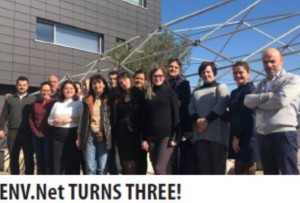 ________________________________________________
________________________________________________
In December 2017. we started with ENV.net 3 : ENV-net factoring the environmental portfolio for Western Balkans and Turkey in the EU Policy Agenda (reference number 2017/394-372)
ENV.net 3 – Serbia team include: Aleksandra Mladenovic –National Coordinator and Manager. In addition, Thematic experts/consultants, on demand, are Prof dr Andjelka Mihajlov and Filip Jovanovic, and Media communication expert, on demend, is Milica Momcilovic.
________________________________________________________________________________
Development of ENV.net in West Balkan and Turkey: giving citizens a voice to influence the environmental process reforms for closer EU integration – EuropeAid/132438/C/ACT/Multi – 2012/306-642 and 2014/351-610 (2012-2016)
The project builds on the experience of an EU-funded project, namely the Environment Forum , implemented in the period 2009-2012, aiming at developing capacities of environmental NGOs to establish a constructive dialogue with national authorities. The present project strategy has been designed to achieve a greater commitment and capacity of a group of CSOs coming from Environment Forum experience and which have agreed on the creation of a new network, the ENV.net, to support the civil activism, give citizens a voice and influence the public reform processes in the approximation to the environment acquis. With the view to further enhance their capacities to work with CSOs and to share experience with other European countries, EEB has accepted to participate and to share its experience. Project objective – Greater commitment and capacity of the ENV.net to give citizens a voice and influence public sector reform processes in the environment sector through analysis, monitoring and advocacy.
Partners for project implementation are: Puntosud , EASD , Co-PLAN , EEB – European Environmental Bureau , ATRC and TEMA . EASD Activity circles represent the scope of our activities.
Project launched site for presentation of activities in all participating countries, as well as facebook page and ENV.net Newsletters.
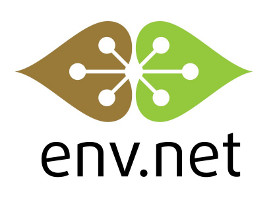 ENV.net 1/2– Serbia team include: Dr Nataša Žugić Drakulić –National Coordinator and Filip Jovanović – project manager , chosen in transparent process by „ Environmental Ambassadors for Sustainable Development“, partner organisation in this project. In addition, National consultant for European integration is Prof dr Andjelka Mihajlov , dr Hristina Stevanović Čarapina is leading expert .
ENV.net 1/2– Serbia team include: Dr Nataša Žugić Drakulić –National Coordinator and Filip Jovanović – project manager , chosen in transparent process by „ Environmental Ambassadors for Sustainable Development“, partner organisation in this project. In addition, National consultant for European integration is Prof dr Andjelka Mihajlov , dr Hristina Stevanović Čarapina is leading expert .
__________________________________
ENV.net Serbia network is functioning : Some of activities could be followed only in Serbian, like calls to participate, and other actions targeted to citizens in Serbia.
**************************************
Highlights: ENV.net publications
- A Guideline of EU Accession Monitoring Tools for CSOs in candidate and potential candidate countries: Chapter 27, (Authors and contributors: Andjelka Mihajlov, Natasa Zugic-Drakulic, Filip Jovanovic, Federico Bastia, Simona Pogliani, Mara Silina, Teida Shehi and Dusko Hristov), Published by Environmental Ambassadors for Sustainable Development with the financial assistance of the EU – ENV.net project document, Belgrade January 2015
- How to influence environmental policy through effective advocacy (Authors: Margherita Tolotto and Mara Silina), ENV.net Advocacy Toolkit, European Environmental Bureau, Brussels, January 2015
- Climate change and challenges of the enlargement (Authors: Anja Kolmuss, Dragana Mileusnic, Zanna Vanrenterghem and Richard Filcak), ENV.net Advocacy Toolkit, European Environmental Bureau, Brussels,September 2016
June 2016: Agenda, WED Messages from Serbia: 12th Regional Conference “Environment to Europe” , REPORT FROM EnE16-ENV.net, BELGRADE, SERBIA
April 2016 – ENV.net Course: CSO Participation in Accession Process , Chapter 27: CSOs participation
March 2016 – New internet portal: Greenweb
January 2016 – Save the date for EnE16-ENV.net Conference ; We participate: Regional Conference: „Sustainability of the FPAs” , Brussels . Water-food-energy-ecosystems nexus assessment in the Sava River Basin – Lessons learned and further steps
October – December 2015 – Ministry support to ENV.net , Event
October – Partnership for Climate Change issue : Serbia’s climate talks – on the way to Paris
June 11 – European Commission Vice-President Mr Maroš Šefčovič had meeting with CSOs in Belgrade. EASD participate!
June 7 – Bicycling-ENV.net promotion in town Gornji Milanovac , Green day in Gornji Milanovac
June 5 – Regional Conference ”Environment to Europe” EnE15 – ENV.net EU Environmental Horizontal Legislation: Methods, Standards and Tools , Invitation , AGENDA , Proc. of papers
May 26, 2015 – Promotional activity
April 21, 2015 – Participation in Public Hearing on Climate Change related challenges in Republic of Serbia
April – THE ELEVENTH REGIONAL CONFERENCE ENVIRONMENT TO EUROPE – ENE15 – ENV.NET acknowledged as the European Sustainable Development Week event
March 22 – Celebrating the World Water Day in Serbia: field visit to Ada Ciganlija
February 2, 2015: Invitation for EnE15-ENV.net Conference launched
January 29, 2015: A Guideline of EU Accession Monitoring Tools for CSOs in candidate and potential candidate countries (ENV.net region): Chapter 27 , document finalized
January , 2015: Promotion of Publication
December 31: Thematic Publication “Environment to Europe”, 2014 ( Tematski zbornik radova “Životna sredina ka Evropi”)
December 12: ENV.net Serbia Seminar: Environmental Education in Schools
November 24-25, ENV.net on the margins of ECF Annual Meeting in Brussels with European Commision
November 4-5 , Regional training on the process of designation of potential Natura 2000 sites
October 30 – Conference “EU accession in the field of environmental protection and the role of local authorities”
October 28 – Ministry of Agriculture and Environmental Protection is co-funded ENV.net project , contract signed
October 22-23, Belgrade: ENV.net training: “EU project design process and Implementation of environmental policy”, Invitation , Agenda , Training
October 2014 – ENV.net brochure published and presented
October 14 – ENV.net related: Participation on Conference “Eco-standards and Education”
October 8 – “Little progress has been made in the areas of environment and climate change”
September 29 – ENV.net Round-table Dialogue for Green Future (ENV.net okrugli sto sa niškim srednjoškolcima “Dijalogom ka zelenijoj budućnosti“) (sub-grant)
September 23-25, Brussels: ENV.net preparatory partnership meeting and Framework Partnership Agreement (FPA) Closing Event for Phase I
September 19-24 , We are following Explanatory Screening for the Chapter 27
August 29 – ENV.net (sub-granting) publication published PUBLICATION : “Species of plants and animals of special conservation concern in EU” , in Serbian
July 27 – Partnership with media – Radio Beograd 2
June 19 – Eco-package initiative as the example environmental education for the future EU citizens
June 5 – CONFERENCE , ENV.net multi-stakeholder Conference on Chapter 27: about 200 participants
June 4 – Meeting with media , Moments from the Conference for Media
May 29, 2014 – ENV.net Serbia Conference organisation on the good track –Agenda for EnE14/ENV.net Conference “Environment to Europe”, June 5, 2014 in SCC – opening at 10:00
May 22-24, 2014 – 4th Partners Meeting in Milan
May 13, 2014 – European Solar Days – participation in promotion of EU environmental values
May 10, 2014 – ENV.net Let us clean up Europe! event: Ada Ciganlija Beograd ; ENV.net Serbia with children, parents and teachers “cleaning up Serbia” , Event in pictures
May 22-24, 2014 – 4th ENV.net Partners Meeting in Milan
May 7-8, 2014 – Some of ENV.net Partners meet in the corridors of ECRAN ECF Meeting
April 25, 2014 – UNEP acknowledged EnE14-ENV.net 2014 Conference as the World Environmental Day Event
April 5, 2014 – Education for future citizens of EU: guest lecturing at the Law Faculty
April 4, 2014 – EU Delegation to Serbia: Consultative Meeting with CSOs on progress towards EU in 2014
Aprl 4, 2014 – We participated to the meeting related to EU-Serbia Civil Society Joint Consultative Committee – JCC
April 2, 2014 – ECRAN NGOs Environment and Climate Change Forum – Evaluation Outcome – Congratulation to ENV.net partners!!!!
April 1, 2014 – Protego and Protecta sign subcontracting contracts
Marc 20-9, 2014 – EASD written contribution to the 2014 Progress Report
March 25, 2014 – Participation on UNECE consultation related to the 3rd EPR for Serbia
March 23, 2014 – ENV.net sub-grants winners announced , ENV.net
March 20, 2014 – We participate on Panel at Faculty of Organisation Sciences – University of Belgrade : Knowledge about Environment
March 9, 2014 – Technical (formal requests) evaluation of sub-grants application finished: 45 projects eligible for further evaluation
March 6, 2014 – Promotion of global activity EARTH HOUR (Marh 29, 20:30-21:30) and call for participation
March 4-6, 2014 – We participate in Zagreb on Workshop on Water-Food-Energy-Ecosystems Nexus Assessment in the Sava River Basin
From February 2014 – EU negotiation process: we are following explanatory screenings
February 26, 2014 – In accordance with procedure, QUESTIONS by potential applicants with our ANSWERS are posted on web site on February 26, at 07:00 , taking in account questions received by February 25 at 23:59
February 20-21, 2014 – EASD-ENV.net Serbia participated in defining the first strategic framework for CSOs development
February 18,2014- Knowledge based advocacy: Environment should be within priorities in the negotiations with EU
February 13, 2014 – Environment in youth policy in Serbia
February 12, 2014 – Meeting with ENVAP2 Project representatives
February 7, 2014 – Participation on Training related the Sector Planning Documents – SPDs
February 1, 2014 – Call of proposals for ENV.net sub-granting in Serbia “EU: we watch and learn to be ready!”
January 30, 2014 – Participation on public hearing by the European Economic and Social Committee (EESC) Study Group
January 30,2014 – Thematic meeting of the SECO mechanism on IPA II programming
January 30, 2014 – Participate in the Mapping of CSOs and other stakeholders in in the process of EU accession negotiations
January 19, 2014 – EASD / ENV.net Team reading of European Parliament Resolution, January 2014
January 07, 2014 – Starting preparation for ENV.net 2014 Round-table / Conference
January 2, 2014 – Attention to ENVIRONMENT in EUROPA DAIRY
_______________________________________________________________
December 23, 2013 – Workshop on environmental values for kindergarten children from Sombor (Minutes) , Participation on meetings in Nature Protection Institute and Agency for Environmental Protection
Decembar 20, 2013 – In media : Promotion of knowledge based information
December 20, 2013 – Environmental Education for future EU citizens , Minutes
December 17, 2013 – ENV.net region news: European Affairs ministers give green light to Serbia’s EU negotiations
December 16, 2013: Workshop for strategic planning of further work SECO mechanism
December 3, 2013 – ENV.net presented to the master students of Faculty of Security Studies
December 2, 2013 – Eye on EU integration process: Parliament of Serbia , Eye on SEE regional cooperation
November 28, 2013 – Meeting FPA project grantees with DG Enlargement representative
November 25, 2013 – Partnership with Media : Partnership agreement with Journalist’ Association of Serbia
Environmental Education of future EU citizens: Activity on November 19,2013
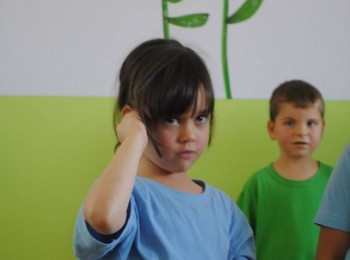 |
Acknowledging the outreach of ENV.net Survey and ENV.net 2013 Roudtable recomendations, EASD – ENV.net Serbia recognized importance of children/youth education for active EU citizenship , through promotion of EU environmental values. We would like to share moments from kindergarten “Pčelice”, from village Šetonje, as promotion event for environmental values in education. With children and teachers, as well as EASD Team, there were Prof dr Ivica Radovic and mr Ljubiša Antonijević, assistant ministers for education and science. |
Partnership with municipality – On November 18., 2013, ENV.net project presented on the Round table in Municipality Vračar (within City of Belgrade).
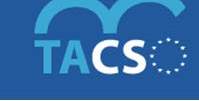 Cooperation with TACSO Serbia – On November 15. 2013, in Belgrade, TACSO Advisory Committee (LAG) organized a consultative meeting with representatives of civil society organizations and networks and Serbian civil society expert community. At the meeting a draft of a document on the assessment needs of civil society in Serbia was discussed.
Cooperation with TACSO Serbia – On November 15. 2013, in Belgrade, TACSO Advisory Committee (LAG) organized a consultative meeting with representatives of civil society organizations and networks and Serbian civil society expert community. At the meeting a draft of a document on the assessment needs of civil society in Serbia was discussed.
 EASD prepared Opinion and contribution to the Draft Strategy Paper for the Republic of Serbia 2014-2020. Through SECO mechanism opinion is sent to Governmental Office for European Integration. Opinion is based on Serbia 2013 Progress Report and Strategy – Reading by ENV.net Serbia Team .
EASD prepared Opinion and contribution to the Draft Strategy Paper for the Republic of Serbia 2014-2020. Through SECO mechanism opinion is sent to Governmental Office for European Integration. Opinion is based on Serbia 2013 Progress Report and Strategy – Reading by ENV.net Serbia Team .
Organisation capacity building process: EASD acknowledged becoming IPEN network Participating Organization
Eye on environmental laws changes: monitoring compliance with EU directives
November 2013. – The third ENV.net partnership meeting in Milan
28. October – Meeting with European Parliamentarians
ENV.net Serbia Team prepared document: Reading of 2013 Progress Report for Serbia and Strategy by ENV.net Serbia Team ( Serbia 2013 Progress Report and Strategy – Reading by ENV.net Serbia Team ).
____________________________________________________
22. and 23 October – Education on sustainable management of lead/chemicals
October 18 – EC Delegation in Serbia, present to relevant CSOs, on October 18, 2013 , Serbia Progress Report 2013, in which the Commission services present their assessment of what Serbia as the candidate country has achieved over the last year.
October 2013 : Participated on different events organized to raise awareness to EU approximation environmental challenges.
Promotion of ENV.net facebook page!
October 2, 2013 – ENV.net team participated at the First SEE Regional Science Promotion Conference (SCIPROM), opened in Belgrade, with the aim to bring together science promotion professionals, practitioners and enthusiasts to share experience and network in order to strengthen the link between science and society in our Region. In the current competitive global environment it is an imperative to enhance economic and social capacities by improving the educational structure of society, inspiring innovation and technological advancement and creating a milieu for appreciation of the value and benefits of knowledge. In the opening address, Minister for Education, Science and Technology development of Serbia underlined, among others the importance of knowledge based actions, as well as the importance of drinking water for development. Conference bring international experts and representatives of international organizations, research and educational institutions, science camps, science communicators, NGOs, private sector and media on board.
This conference justify the path of ENV.net Serbia implementation and development, linking European Integration, Knowledge based activities and sectors : Education, Science and Environment/Natural Resources.
____________________________
Waste management and water management are considered as two important segments of environmental acquis and studies in this area represent an important aspect of ENV.net project. Environmental accession status of Serbia ( waste , water and EIA thematic issues) was presented by EASD team at International Conferences in Vienna (Austria) and Zadar (Croatia), as well as on chemicals at SAICM Regional Meeting (Skopje, Macedonia FYR).
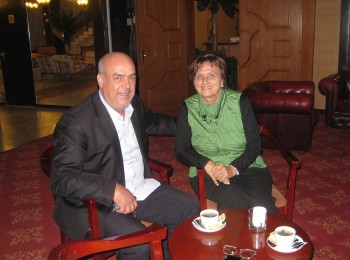 In addition, possible ENV.net partnerships are discussed with other participants and interested CSOs.
In addition, possible ENV.net partnerships are discussed with other participants and interested CSOs.
In Skopje, EASD representative met Macedonian 4x4x4 BB representative on September 26, 2013, to discuss possible enlargement of ENV.net project to Macedonia.
________________________________________
Promotion of ENV.net site in place Join us!
Added value for ENV.net Serbia is EASD activities within the development of Post-Rio+20 Agenda.
Office for Cooperation with Civil Society organized on September 6, 2013 Conference devoted to negotiating Chapter 27 (Environment). Presentation (in Serbian) from the Conference includes: Poglavlje 27 pregovori, Iskustvo R Slovenije, Natura 2000 Ministarstvo, Uloga civilnog drustva u monitoringu, Natura 2000 NGO )
September 2013: ENV.net project presented in the Ministry of Education, Science and Development of Serbia (Meeting of the National Committee for Environmental Education Programs)
August 2013. – Snapshot analysis : While waiting for EC 2013 Progress Report
___________________________________________________________________
Citizen science concept in terms of adaptation and mitigation to the climate change
“Citizen Science refers to the general public engagement in scientific research activities when citizens actively contribute to science either with their intellectual effort or surrounding knowledge or with their tools and resources” .
In last decade, direction in science development moved from traditional circle of research to the new ways, by involving the public and becoming more and more inclusive in a growing range of disciplines. Historically this is not new that universities/academic researchers need to start involving public, citizens, civil society organizations… in their own activities (like Benjamin Franklin or Charles Darwin in the topics of topics that include applied life sciences and health research. It is evident that Citizen Science grows, reflecting in creation of large data sets (especially in monitoring and observing. The main challenge and very applicative approach is to involve citizen scientist in research of the topic that is very important for every unique life and that tackle every single citizen – CLIMATE CHANGE.
It is a question how citizens can be involved. Let we see some facts regarding ongoing climate change issue globally and in Serbia. The fact known wider is that from 1850 until know, temperature raised for 1 degree. The problem is that in relatively short period of time, temperature rises continually. Regarding Serbia, developing country, some of the consequences are following:
At the yearly level, every citizen from Serbia emits 4-5 t of carbon dioxide, what is a quantity at least 10 times bigger than quantity of communal waste per citizen per year. Precipitation is at the same level, more or less, but the problem that we are faced on is that redistribution is uneven. Dried periods are increased, for the period of 83 years, there were 13 dried periods, while in last 47 years, and same number of dried periods are evidenced. Furthermore, number of precipitation days of 20, 30 i 40 mm/per day also increase, especially important is that almost 5 times increased precipitation values of 40 mm/per day, for the period 2001-2017 compared to the period 1951-1980. The problem that urban places faced with relates to the sewage system, it is not constructed to accept raised amounts of atmospheric waters. Climate change goes beyond, without comeback to the previous, „climatelly“ better time!
Globally, to combat climate change, it is very important to follow Paris agreement conclusions and obligations. It should be taken into account that damages caused climate changes costs: at the EU level, from the period 2010-2016, 12,6 billions of eur (or from the period 1980-2016, costs are 436 billions of eur)
Possible practical solution is to include adaptation into future plans, construction, and agriculture through calculation of climate change parameters in order to avoid consequences of extreme climate events. That means to construct savage system to be able to accept extreme amounts of different precipitations, even it is not necessary in this moment.
What is solution and form of citizens’ engagement?
There is a recent project “Territorial RRI Fostering Innovative Climate Action (Responsible Research and Innovation)” with eight partners from Europe, among them Serbia and Center for the promotion of science, under Horizon 2020. One of the pilot region will be Belgrade. This project envisages active participation of citizen, civil society organizations, scientific and research institutions in applying adaptation measures at basic level of the society. The interactive map will be produced, where citizens will be able to mark places and points in the City of Belgrade, where they are fill uncomfortable during the year, in terms of climate parameters. This will help in future planning to pay more attention of local community what adaptation and mitigation measures to apply to these areas.
Environmental Ambassadors for Sustainable Development, as member of ECSA network, will use citizen science approach to contribute to better understanding what are possibilities of citizen engagement exist through Eco-school network in different parts of Serbia.
Eco-Paket (Eco-Package) in Eco-Schools
Eco-package is a project implemented in Serbia since 2013/2014 school year, exclusively run in the framework of the International Eco-schools Programme.
Until 2019 the number of Eco-Schools participating in the project increased continuously. This project supported Eco-schools network in their activities performed to be linked to the education for sustainable development through realization of UN Sustainable Development Goals, primarily Goal 4 (Quality education), Goal11 (Sustainable cities and communities) and Goal 17 (Partnerships for the Goals).
The project consisted of three activities:
• creative art work competition: based on different theme, every year the students are collecting used beverage cartons (UBC)
• collection of used beverage cartons (UBC) and
• educational workshops for school children including the demonstration how UBC can be turned into paper (these workshops are being conducted by EASD since 2015/2016 school year).
The main goal was to raise awareness among pre-school children, school children and students of Eco-schools, their families and wider community about the need for sustainable use of resources on the example of correct methods of separation, disposal and recycling of used beverage cartons
Specific goals were:
– Educate pre-school children, school children and students about correct methods of separation and disposal of used beverage cartons.
– Encourage wider community to participate in the process of collection and recycling of used beverage cartons in order to raise their environmental awareness.
– Introduce sustainable forest management principle through FSC model, including sustainable production and consumption of used cartons.
– Present and promote companies and businesses that have incorporated the principles of sustainable development and social responsibility towards the environment and natural resources into their operation.
Main target groups were children in kinder gardens (pre-school institutions), pupils in primary and secondary schools and university students, as well as teaching and non-teaching school staff
Other target groups were parents/families/neighbours, local communities (including local companies, institutions, organizations) and media.
Outreach include Eco-schools Serbia network management, workshops organization, preparation of educational material, knowledge based advocacy, raising awareness among educational institutions and local communities on circular economy issue, establishing good cooperation with local communities where Eco-schools exist
From 2019/20 project is not active at national level
________________________________________________________________________________
More about Eco-Schools Program in Serbia.
Also, detailed instructions are posted in Serbian, as well as most news and announcements.
In addition, there is separated dedicated web sites (in Serbian) for this Eko-paket (Eco-Package) project, supported by Tetra Pak in Serbia.
________________________________________________
October 2018: Circular economy knowledge based advocacy in Eco-schools network in Serbia
October 2017: Eko-paket – Eco-Schools annual conference for the school year 2017/2018
May 2017: Eko-paket 2017 outcome
September 2016: Education for Sustainability
September 2016: FEE General Assembly 2016 and International Conference on Education for Sustainable Development, Ahmedabad, India
June 2016: WED Messages from Serbia: 12th Regional Conference “Environment to Europe”
May 2016: EASD Knowledge Partner with CEE for ESD for transforming education for children and youth
November 2015: Eco-Schools 2015 NOM in Northern Ireland
October 2015 – SDGs as the relevant part of the context within which FEE operates
January 2015 – Eco-schools Serbia in the International Eco-schools news
December 2014, status: ECO-SCHOOLS FAMILY IN SERBIA IS GROWING, CATALYZED BY ECO-PACKAGE ACTIVITY, On December 12, 2014 in Belgrade, two different activities, merged in one great and successful event, happened: Green Flags Award ceremony and Annual meeting of Eco-Schools Coordinators. Over 50 participants were present from all levels of education institutions. The main topics discussed include different ideas and methods on how environmental education in schools could be enhanced and better represented in school curriculum. Positive experiences are shared, in particular related motivation through ECO-PACKAGE activity, supported in Serbia by Tetra-Pak Production Company (Tetra Pak Production d.o.o Beograd in 2013/14 and 2013/14 supports Eco-Schools Program in Serbia, as a socially responsible company). From 3 Eco-schools in 2012/13, 15 in 2013/14, in Serbia there are in the moment 24 schools in different stages of Eco-School Program implementation 2014/15 (2 higher education institutions level, 1 secondary school level, 18 elementary schools and 3 pre-schools). Behind this growing success is NO Team in Serbia (from organization Environmental Ambassadors for Sustainable Development): National FEE Mentor for FEE Programs Prof.dr. Andjelka Mihajlov, National Eco-School Coordinator (until October 2014 Milica Petrovic, from October to December 2014 Dragana Grujicic, and in 2015 expecting new dedicated person on the board), National FEE Council (with representatives of supporting ministries, other relevant institutions and experts), Prof. dr. Natasa Zugic-Drakulic – Executive Director, assistance of Milena Tabasevic and Marina Marjanovic, as well as Coordinators and dedicated teachers, professors and principals in Eco-Schools (participants of 2014 Seminar): Andrijanić Zoran, Angeleski Alma, Babović Dragana , Božilović Dragica, Bursać Slađana,Davidović Stevan,Despotović Slavica, Đurović Ljiljana, Gligorovski Tatjana, Grahovac Prole Milijana, Ivanović Vesna, Janković Danijela, Jeličić Biljana, Joksimović Ana, Jovanović Dragana, Kocić Vesna, Luković Verica, Luković Brankica, Maksić Marina, Mandić Miroslav, Miloradović Dragana, Milosavljević Zorica, Momčilović Verica, Nikitović Dragana, Nikolić Perčević Đulica, Pantović Zoran, Perić Snežana, Sekulić Dragojle, Simendić Siniša, Stoiljković Slavica, Strugar Aleksandra, Vasiljević Milka, Večei Funda Valerija, Vidojević Mirjana, Vranić Darko, Grujičić Marina, Malinić Uglik Sanja, Planić Vasilie, Marković Jasmina, Radić Marija, Stanojlović Dragana and Ceranić Đuro. Moments from the Event are available at: http://ambassadors-env.com/gallery/eko-skole-12-12-2014/ and http://ambassadors-env.com/gallery/eko-skole12-12-2014-deo-2/
December 2014 – Eco-schools National Operators Meeting 2014 ; National Meeting of Eco-Schools Coordinators
May 2014 – With children, parents and teachers “cleaning up Serbia”
January 2014. : There are 18 schools in the Program, 3 of them already awarded with Green Flag
Meeting with Eco-Schools Coordinators, December 2013
Tetra Pak Production d.o.o Beograd in 2013/14 start to support Eco-Schools Program in Serbia. Tetra Pak, as a social responsible company takes part in this Program in order to raise awareness of children and local communities on the importance of responsible behaviour towards environment.
The first GREEN FLAG ceremonies : September 19 and 12, 2013 , November 19 2013
National FEE Committee Meeting, September 6, 2013 : 3 schools awarded
_________________________________________________
3 schools applied and started process in 2012-13 .
June 2013: International Mentor visited school “Drinka Pavlović” in Belgrade.
_________________________________________________
Program activities include summer schools, summer camps, etc.
Related activities: Education for Sustainable Development
Recap the moments— EnE19
EnE19 Conference / Round table AIR QUALITY IN SERBIA AND REGION, YESTERDAY, TODAY, AND TOMORROW – CLEAN AIR – HEALTHY FUTURE, was held in Belgrade on June 4th, 2019. It was platform for interesting and fruitful statements and discussion.
On the World Environment Day in the European sustainable development week, traditionally, this event is organized by “Environmental Ambassadors for Sustainable Development” and Serbian Chamber of Commerce – “Environment towards Europe – EnE19″.
Presentations will be posted soon …
Goran Trivan , Minister, Ministry of Environmental Protection of Republic of Serbia / ministar zaštite životne sredine Republike Srbije
□ Stanojla Mandić, Deputy Commissioner for Information of Public Importance and Personal Data Protection of the Republic of Serbia / zamenik Poverenika za informacije od javnog značaja i zaštitu podataka o ličnosti Republike Srbije
□ Aleksandar Peric, Chamber of Commerce and Industry of Serbia , Co-organizer of the EnE19 Conference/ Privredna komora Srbije, koorganizator Konferencije
□ Aleksandra Mladenovic, Environmental Ambassadors for Sustainable Development , Co-organizer of the EnE19 Conference/predsednik Ambasadora održivog razvoja I životne sredine, koorganizator Konferencije
Dragan Ðurica, Pomoćnik pokrajinskog sekretara za urbanizam i zaštitu životne sredine – Sektor za monitoring i informacioni sistem životne sredine: Kvalitet vaduha – dela pre reči
dr Elizabet Paunović , bivsa šefica Evropskog centra za životnu sredinu i zdravlje Svetske zdravstvene organizacije (SZO) / former head of WHO European Centre for Environment and Health. Nacionalna implementacija Agende 2030 kao odlicna prilika za smanjivanje negativnog uticaja zagadjenog vazduha na ljudsko zdravlje
dr sci Uroš Rakić, Institut za javno zdravlje Srbije “dr Milan Jovanović Batut” : Aerozagađenje kao faktor rizika po zdravlje
Andrej Šoštarić, Gradski zavod za javno zdravlje Beograd: Monitoring kvaliteta vazduha u Beogradu
Prof dr Svetlana Stanišić, Univerzitet Singidunum: Veza između kvaliteta vazduha u Beogradu i smrtnosti
Marko Kazimirović, Univerzitet u Beogradu, Šumarski fakultet: Uticaj rasta šuma na kvalitet vazduha
Milenko Jovanović, Načelnik Odeljenja za kontrolu kvaliteta vazduha, Agencija za zaštitu životne sredine, Ministarstvo zaštite životne sredine, Republika Srbija: Analiza stanja kvaliteta vazduha u Srbiji u 2018. godini
Dunja Đenić , član gradskog veća zadužen za zaštitu životne sredine i energetsku efikasnost grada Uzica gradska uprava: Aerozagađenje u Užicu
Zoran Živkovic, zamenik gradonačelnika Valjeva: Aerozagadjenje u Valjevu
Ivana Krstić, Sekretar Sekretarijata za zaštitu životne sredine Grada Niša : Aerozagađenje u Nišu
Mirjana Mitrović, Agencija za zaštitu životne sredine, Ministarstvo zaštite životne sredine, Republika Srbija: Polen u Srbiji
#BeatAirPollution: SOS za insekte/oprašivače, Eko-škola “Drinka Pavlović”, Beograd
Aleksandra Mladenović, predsednik, AOR, Refleksija na odluke i dogadjaje u okviru UNEA4, koje su usmerene na zastitu vazduha od zagadjenja: fokus na uzroke
Prof dr Marija Jevtić, Medicinski Fakultet Univerzitet Novi Sad / Institut Za Javno Zdravlje Vojvodine
“Citizens science” – u izazovima kvaliteta vazduha
Aleksandar Macura, suosnivač, direktor programa RES fondacija, Trošenje javnih sredstava za mere smanjenja zagađenja vazduha: Kriterijumi i način sprovođenja
Srđan Kukolj, Health and Environment Alliance: Kvaliteta vazduha i uticaj na zdravlje čovjeka
Dragan Jeremić, Državni sekretar i Predsednik radne grupe za donošenje mera za smanjenje aerozagađenja, Ministarstvo zaštite životne sredine,
Some moments from the event at: https://www.facebook.com/EASD.AOR/
In media:
Round table AIR QUALITY IN SERBIA AND REGION, YESTERDAY, TODAY, AND TOMORROW – CLEAN AIR – HEALTHY FUTURE: draft agenda available
Program /Agenda
Nacrt AGENDE – Finalna agenda će imati dopune
Draft Agenda as on May 22, 2019 –Final agenda will be adopted to the June 4th status
4. jun June 4th
Sala PKS, Resavska 13-15 Beograd Serbian Chamber of Commerce Conference room,
Resavska 13-15, Belgrade
9:30 – 10:00 Registracija učesnika / Registration
10:00 – 10:40 Uvodna obraćanja /
Opening remarks
Predsedavajući/Chair persons: mr Dušan Stokić – PKS, dr Uroš Rakić, mr Aleksandra Mladenović – Ambasadori održivog razvoja i životne sredine
Goran Trivan , Minister, Ministry of Environmental Protection of Republic of Serbia / ministar zaštite životne sredine Republike Srbije
□ Stanojla Mandić, Deputy Commissioner for Information of Public Importance and Personal Data Protection of the Republic of Serbia / zamenik Poverenika za informacije od javnog značaja i zaštitu podataka o ličnosti Republike Srbije
□ Mihailo Vesović, advisor of president, Chamber of Commerce and Industry of Serbia , Co-organizer of the EnE19 Conference/ Privredna komora Srbije, koorganizator Konferencije
□ Environmental Ambassadors for Sustainable Development representative, Co-organizer of the EnE19 Conference/Predstavnik Ambasadora održivog razvoja I životne sredine, koorganizator Konferencije
Note: Competent authorities and international community in Serbia were invited to address the event with opening remarks – the list will be updated when receive official confirmation
Napomena: Nadležni organi i diplomate/međunarodne organizacije u Srbiji su pozvani da pozdrave konferenciju – ova lista će biti dopunjena kada organizatori budu dobili zvanične potvrde o prihvatanju poziva
Grupno slikanje / Group photo
Okrugli sto/Round table
Moderator dr Uroš Rakić
Introductory presentations, by invitation – Uvodna obraćanja, po pozivu
(sugerisano trajanje 10 minuta)
Discussion – Diskusija
10:45 -12:30
Filip Radović, direktor Agencije za zaštitu životne sredine, Ministarstvo zaštite životne sredine,
Republika Srbija, naslov će biti poznat do konferencije:
Dragan Ðurica, Pomoćnik pokrajinskog sekretara za urbanizam i zaštitu životne sredine – Sektor za monitoring i informacioni sistem životne sredine: Kvalitet vaduha – dela pre reči
dr Elizabet Paunović , bivsa šefica Evropskog centra za životnu sredinu i zdravlje Svetske zdravstvene organizacije (SZO) / former head of WHO European Centre for Environment and Health. Nacionalna implementacija Agende 2030 kao odlicna prilika za smanjivanje negativnog uticaja zagadjenog vazduha na ljudsko zdravlje
dr sci Uroš Rakić, Institut za javno zdravlje Srbije “dr Milan Jovanović Batut” : Aerozagađenje kao faktor rizika po zdravlje
Andrej Šoštarić, Gradski zavod za javno zdravlje Beograd: Monitoring kvaliteta vazduha u Beogradu
Prof dr Svetlana Stanišić, Univerzitet Singidunum: Veza između kvaliteta vazduha u Beogradu i smrtnosti
Marko Kazimirović, Univerzitet u Beogradu, Šumarski fakultet: Uticaj rasta šuma na kvalitet vazduha
Discussion interventions by invitation -Diskusione intervencije po pozivu –
(sugerisano trajanje 5 minuta)
Discussion – Diskusija
12:30-13:00 Milenko Jovanović, Načelnik Odeljenja za kontrolu kvaliteta vazduha, Agencija za zaštitu životne sredine, Ministarstvo zaštite životne sredine, Republika Srbija: Analiza stanja kvaliteta vazduha u Srbiji u 2018. godini
Vladimir Savić, Pomoćnik direktora za kvalitet , Zavod za javno zdravlјe Kralјevo:
Lokalni monitoring kvaliteta vazduha na teitoriji grada Kraljeva
Dunja Đenić , član gradskog veća zadužen za zaštitu životne sredine i energetsku efikasnost grada Uzica gradska uprava: Aerozagađenje u Užicu
Zoran Živkovic, zamenik gradonačelnika Valjeva: Aerozagađenje u Valjevu
Ivana Krstić, Sekretar Sekretarijata za zaštitu životne sredine Grada Niša : Aerozagađenje u Nišu
Mirjana Mitrović, Agencija za zaštitu životne sredine, Ministarstvo zaštite životne sredine, Republika Srbija: Polen u Srbiji
13:00-13:10 #BeatAirPollution: SOS za insekte/oprašivače, Eko-škola “Drinka Pavlović”, Beograd
#BeatAirPollution: SOS for insects/pollinators, Eco-schools “Drinka Pavlovic”, Belgrade
13:10 -14:00
Discussion interventions by invitation, continuation -Diskusione intervencije po pozivu , nastavak–
(sugerisano trajanje 5 minuta)
Discussion-Diskusija
Aleksandra Mladenović, predsednik, AOR, Refleksija na odluke i dogadjaje u okviru UNEA4, koje su usmerene na zastitu vazduha od zagadjenja: fokus na uzroke
Prof dr Marija Jevtić, Medicinski Fakultet Univerzitet Novi Sad / Institut Za Javno Zdravlje Vojvodine
“Citizens science” – u izazovima kvaliteta vazduha
Aleksandar Macura, suosnivač, direktor programa RES fondacija, Trošenje javnih sredstava za mere smanjenja zagađenja vazduha: Kriterijumi i način sprovođenja
Vladimir Spasić, Balkan Green Energy News/ Center for Promotion of Sustainable Development: Aerozagađenje i mediji
Srđana Kukolj, Health and Environment Alliance: Kvaliteta vazduha i uticaj na zdravlje čovjeka
Učešće u diskusiji potvrdili su i : dr Tamara Perunović Ćulić, pomoćnik direktora Agencije za zaštitu životne sredine, Dragan Jeremić, Državni sekretar i Predsednik radne grupe za donošenje mera za smanjenje aerozagađenja, Ministarstvo zaštite životne sredine,
14:00 Conference closing (coorganisators) –
Zatvaranje konferecije (obraćanje u ime kooganizatora)
Advancing environmental sustainability action- Financial Support to Third Parties for Monitoring and Evidence-Based Advocacy under the ENV.Net Project –
“Advancing environmental sustainability action” is a new theme in the frame of the project: “ENV.Net Factoring the Environmental Portfolio for WB and Turkey in The EU Policy Agenda” (IPA 2017/ 394-372), connected to financial support to third party for monitoring and evidence-based advocacy. Awarded organizations and projects are following:
1. “Education Development Centre “Planet” from Sombor, project “The Hive- circular economy as a model of entrepreneurship for the youth”
2. Association of citizens „Zlatiborski krug“ from Čajetina, project „Model of circular economy in the service of environmental protection in the municipality of Cajetina“
3. Non-smoking Educational Center„EKO-Nec“ from Kragujevac, project „The contribution to media reporting on Chapter 27 and a circular economy”“.
During 2019 and partly in 2020, organizations will work to promote the concept of circular economy through entrepreneurial activities of young people at the local level, with customized trainings for different target groups, from children of school age, teachers, parents, representatives of local government, to reporting on the undertaken activities and results achieved, aimed to improve the state of the environment in terms of local sustainable development.
The projects will start with implementation on February 1, 2019 and will include over 200 participants from participating local communities and organizations of sub-grantees. We expect the first results in April and we believe that the concept of “circular economy” will not remain as a good idea that is being talked about, but will become an integral part of future entrepreneurial initiatives, from youth and educational level to business and economic, in order to improve initiatives and raise awareness on need to protect the environment and to safe resources as much as possible.
Join us for June 5th: Conference Agenda is available
Pictures from the event:
Otvaranje / Opening
Panel o zastiti prirode / Panel on Nature Protection
UNEP nagrade / UNEP@WED
YRE awwards/ Nagrade Mladih ekoreportera & https://www.facebook.com/mladiekoreporteri/
Prezentacija radova / Presentations
The Fourteenth Regional Conference – EnE18
Environment to Europe
Belgrade, Serbia, June 5, 2018
Nature protection – Nature-Responsive Development
Conference Agenda, draft, as on 22/05/2018
Conference “Environment to Europe” – EnE18 is an official event that marks the UN World Environment Day (WED) in the Republic of Serbia and region. Since its beginning in 1974, World Environment Day has developed into a global platform for raising awareness and taking action on urgent issues from marine pollution and global warming to sustainable consumption and wildlife crime. “Beat Plastic Pollution”, the theme for World Environment Day 2018, is a call to action for all of us to come together to combat one of the great environmental challenges of our time. Chosen by this year’s host, India, the theme of World Environment Day 2018 (If you can’t reuse it, refuse it) invites us all to consider how we can make changes in our everyday lives to reduce the heavy burden of plastic pollution on our natural places, our wildlife – and our own health. In recent years, millions of people have taken part in thousands of registered activities worldwide.
Conference “Environment to Europe” – EnE18 is an official event that marks the European Sustainable Development Week (ESDW) in the Republic of Serbia. The ESDW is a European-wide initiative to stimulate and make visible activities, projects and events that promote sustainable development and the Sustainable Development Goals (SDGs). It takes place every year from 30 May until 5 June. The ESDW aims to raise awareness for the 2030 Agenda in Europe and calls upon local stakeholders to actively engage with sustainable development, in general, and the SDGs, in particular.
The Fourteenth Regional Conference EnE18 is thematically focused on Nature protection – Nature-Responsive Development (2018). Since 2005, when we established the Conference, we have around 2.500 participants from 15 countries and presented about 350 research and scientific papers. This year is also fourteen years of partnership between “Environmental Ambassadors for Sustainable Development“ with the Chamber of Commerce and Industry of Serbia“.
Conference Agenda
as on 22/05/2018; possible changes of Agenda when confirmation received
5. jun June 5th
| Velika sala u PKS, II sprat, Terazije 23, Beograd | Main Hall, 2nd floor – Serbian Chamber of Commerce, Terazije 23, Belgrade |
9:00 – 10:00 Registracija učesnika / Registration
10:00 – 10:50 Uvodna obraćanja / Opening remarks
Moderator: dr Uroš Rakić, on behalf of organisators
- H.E. Ratko Vlajkov, Ambassador, Embassy of the Republic of Bulgaria in the Republic of Serbia – The Bulgarian presidency of the Council of the EU / Ambasador, Ambasada Republike Bugarske u Republici Srbiji
- H.E. Lazar Mirkić, Ambassador, Embassy of Bosnia and Herzegovina in the Republic of Serbia / Ambasador, Ambasada Bosne i Hercegovine u Republici Srbiji
- Robert Nygård, The First Secretary Responsible for Environmental Issues, Swedish Embassy in the Republic of Serbia / Prvi sekretar odgovoran za pitanja životne sredine, Ambasada Švedske u Republici Srbiji
- Delegation of EU in Serbia, representative / Delegacija EU u Srbiji, predstavnik/ (potvrđeno/confirmed, representative tbd)
- Minister for Environment / Ministar za zaštitu životne sredine (invited/pozvan)
- Stanojla Mandić, Deputy Commissioner for Information of Public Importance and Personal Data Protection of the Republic of Serbia / Zamenica poverenika za informacije od javnog značaja i zaštitu podataka o ličnosti Republike Srbije
- Dr Deni Porej, Director of WWF Adria, WWF Mediterranean Programme Office / Direktor WWF Adria, WWF Regionalna kancelarija
- Aleksandra Šiljić Tomić, Project Coordination Specialist, UN Environment Republic of Serbia / Koordinator projekta, Kancelarija UN za životnu sredinu, Republika Srbija
- dr Nenad Sekulić, Head of Department for Biodiversity and Ecological Network, Institute for Nature Conservation of Serbia / Načelnik odeljenja za biodiverzitet i ekološke mreže, Zavod za zaštitu prirode Srbije
- Goran Krnčević, Assistant Director of the Sector for Legal, Financial and Administrative Affairs, Institute for Nature Conservation of Vojvodina Province / Pomoćnik direktora za pravne, finansijske i opšte poslove, Pokrajinski zavod za zaštitu prirode
- Ljubica Naumović, Environment Executive, Tetra Pak Production / referent za zaštitu životne sredine, Tetra Pak Production
- Dušan Stokić, Co-organizer of the EnE18 Conference, Head of the Department for Environment, Technical Regulation, Quality and Social Responsibility, the Chamber of Commerce and Industry of Serbia / suorganizator EnE18 Konferencije, Rukovodilac Službe za životnu sredinu, tehničke propise, kvalitet i društvenu odgovornost, Privredna komora Srbije
- prof. dr Dunja Prokić, the EnE18 Conference Chair person, Environmental Ambassadors for Sustainable Development / predsedavajuća EnE18 Konferencije, Ambasadorka održivog razvoja i životne sredine
10:50 – 11:00 Aleksandra Mladenović, Environmental Ambassadors for Sustainable Development President/ Predsednica Ambasadora održivog razvoja i životne sredine, Plenary, Panel Theme and Panelists / Predstavljanje plenarnog izlaganja, panela i panelista
11:00 – 11:20 Plenary lecture / Plenarno predavanje
Begona Matilla Soloaga, Human Dynamics, Team leader, TA for strengthening the National Nature Protection System for implementation of Natura 2000 requirements / Human Dynamics, tim lider, NATURA 2000 Turska. Focus : NATURA 2000 in Turkey – project outputs / NATURA 2000 u Turskoj – rezultati projekta.
11:20 – 13:30 Panel on Nature Protection and Nature – Responsive Development / Panel na temu Zaštita prirode i razvoj odgovoran prema prirodi
Moderator: Milica Momčilović, journalist, Vice President of World Federation of Science Journalists (WFSJ) / novinar, potpredsednica Svetske federacije naučnih novinara
Panelists (Plenary Session) / Učesnici Panela (Plenarna sesija) :
dr Deni Porej, Director of WWF Adria, WWF Mediterranean Programme Office / Direktor WWF Adria, WWF Regionalna kancelarija. Focus : WWF and Nature Protection, Nature – Responsive Development / WWF i zaštita prirode, razvoj odgovoran prema prirodi.
prof. dr Predrag Simonović, Faculty of Biology, University of Belgrade / Biološki fakultet, Univerzitet u Beogradu . Focus: An invasive species of fish and links between fisheries management and aquaculture in Serbia in the process of EU accession / Invazivne vrste riba i veza između ribolovnog upravljanja i akvakulture u Srbiji u procesu pristupanja EU
mr. Danko Jović, Institute for Nature Conservation of Serbia / Zavoda za zaštitu prirode Srbije. Focus: State in the Republic of Serbia in respect of nature and oblidations of Serbia in the process of accession to the EU in this area / Stanje u Republici Srbiji u vezi zaštite prirode i obavezama Srbije u procesu pristupanja EU u ovoj oblasti.
Klara Sabadoš, Institute for Nature Conservation of Vojvodina Province / Pokrajinski zavod za zaštitu prirode. Focus: The situation regarding nature protection and the NATURA 2000 network in Serbia / Situacija oko zaštite prirode i mreže NATURA 2000 u Srbiji.
Nikola Stanojević, Bird Protection and Study Society of Serbia / Društvo za zaštitu i proučavanje ptica: Protection of birds and obligations of the Republic of Serbia in the process of EU accession in this area / Zaštita ptica i obaveze Republike Srbije u procesu pristupanja EU u ovoj oblasti.
13:30 – 13:40 Technical Break / Tehnička pauza
13:40 -14:00 Awards for the winners of the competition „Beat plastic pollution! If you can’t reuse it, refuse it!“ organized among elementary school classes by UN Environment and partners: Environmental Ambassadors for Sustainable Development and Forestry and Environmental Action for celebration of the World Environment Day 2018 in Serbia / Dodela nagrada timovima iz osnovnih škola u Srbiji, pobednicima na konkursu „U koštac sa plastikom!“ tj. „Pobedi zagađenje plastikom! Ako ne možeš da je ponovo upotrebiš, ne koristi je!“ koji je Agencija Ujedinjenih nacija za životnu sredinu organizovala zajedno sa partnerima: Ambasadori održivog razvoja i zaštite životne sredine i Inicijativa za šumarstvo i životnu sredinu – fea povodom obeležavanja Svetskog dana zaštite životne sredine 2018. u Srbiji.
Obraćanje: Aleksandra Šiljić Tomić, specijalista za koordinaciju projekata Agencije Ujedinjenih nacija za životnu sredinu (UN Environment)
Awarded / Nagrađeni radovi:
1. mesto – rad „Žutoplovac“, OŠ „Sveti Georgije“, Uzdin; Nagradu prima mentor Tatjana Romanov, profesor razredne nastave
2. mesto – rad „Eko brodić – Drugarstvo“, OŠ „Rade Dodić“, Milutovac, izdvojeno odeljenje Poljna; Nagradu prima mentor Suzana Jovanović –Stanisavljević
3. mesto – rad „Brod prijateljstva“, OŠ „Petefi brigada“, Kula; Nagradu prima mentor Marijana Kolarić
Photo exhibition – slideshow of vessels (ships, sailboats, etc.) of all elementary school classes participated in the competition is presented in the front of the Main Hall.
14:00 – 14:20 Awards for the best Young Reporters for the Environment (YRE) in 2018: “Energy Efficiency of the Eyes of Young Reporters for the Environment” / Dodela nagrada najboljim Mladim Eko-reporetima u 2018. godini: “Energetska efikasnost očima Mladih Eko-reportera”
Obraćanje: Dijana Šarac, koordinator Programa Mladi Eko-reporteri
Awarded/ Nagrađeni radovi:
Uzrasna kategorija od 11 do 14 godina
– U kategoriji članaka:
- mesto David Bradić iz OŠ „Rade Dodić“, Milutovac, naziv članka: Sunce i ti
- mesto Lena Veličić, Dunja Milijanović iz OŠ „Sveti Sava“, Čačak, naziv članka: Štednja energije
- mesto Milica Đurić, Teodora Nikša, Milica Popović, Živojin Mišić, Marko Kuleško iz OŠ „Marija Trandafilović“, Veternik, naziv članka: Udaljenost Kejptauna je relativna stvar
– U kategoriji fotografija:
- mesto Milan Pavlović iz OŠ Stojan Novaković, Blace, naziv fotografije: Energetska efikasnost saradnjom svih nas
- mesto Jovana Dimitrijević iz OŠ Sveti Sava, Pirot, naziv fotografije: Moj grad vodi računa o energetskoj efikasnosti
- mesto Ilija Radojković iz OŠ Ratko Mitrović, Čačak, naziv fotografije: Sunce na našem krovu
– U kategoriji videa:
- mesto Đina Ranđelović, Iva Ignjatović iz OŠ „Sveti Sava“ Pirot, naziv videa: Unutrašnji bazen u Pirotu
- mesto Nikola Dragić, Ognjen Kostić, Aleksa Vacić, Dimitrije Stanković iz OŠ „Sveti Sava“, Pirot, naziv videa: Vodenica
- mesto Strahinja Marseni, Anja Lazović, Vladimir Konstantinovića, Andreja Đurkovića, Teodora Radivojević iz OŠ Drinka Pavlović, Beograd, naziv videa: Energetska efikasnost
Uzrasna kategorija od 15 do 18 godina
– U kategoriji članaka:
- mesto Jefimija Najdić iz Gimnazija Vranje, naziv članaka: Dozvolite plućima naše planete da dišu
- mesto Marija Dibrani iz MTŠ „14 oktobar“, Kraljevo, naziv članka: Zelena energija i zdrav život
- mesto Stefan Zeremski, Bojan Zakonović, Vasilije Radović iz ETŠ „Rade Končar“, Beograd. Naziv članka: Sekcija za energetsku efikasnost
– U kategoriji fotografija:
- mesto Olga Đurović iz Gimnazije „Takovski ustanak“, Gornji Milanovac, naziv fotografije: Krov
- mesto Vladana Stanković iz Prehrambeno-hemijske škole, Niš, naziv fotografije: Nova rasveta u Doljevcu
– U kategoriji videa:
- mesto Anja Aranđelović, Milica Jovanović, Gordan Mišić iz Tehničke škole, Paraćin, naziv videa: Menjamo navike da ne bude panike
- mesto Natalija Stanković iz Savremene gimnazije, Beograd, naziv videa: Energetska efikasnost
- mesto 14 učenika iz Medicinske škole, Vranje, naziv videa: Odakle dolazi električna energija
– Uzrasna kategorija od 19 do 21 godine
U kategoriji fotografija:
- mesto Tijana Krnjaić sa Fakulteta Političkih nauka, naziv fotografije: Toplotna pumpa
– U kategoriji videa:
1.mesto Anđela Stošić sa Fakulteta Političkih nauka, naziv videa: Solarni paneli
14:20-15:00 Break / Pauza
15:00-18:00 Presentations / Usmena izlaganja radova
Moderatori: prof. dr Hristina Stevanović Čarapina, prof. dr Nataša Žugić Drakulić, prof. dr Dunja Prokić, dr Uroš Rakić
Plenary lecture / Uvodno predavanje
Uticaj Sporazuma iz Pariza o promeni klime na razvoj ekološkog acquis-a i prenošenje pravnih standarda zaštite biodiverziteta i očuvanja šuma u pravni sistem Srbije, MIRJANA DRENOVAK IVANOVIĆ, PRAVNI FAKULTET, UNIVERZITET U BEOGRADU
Oral presentations / Usmena izlaganja
GEOGRAPHIC MONITORING OF FOREST BIODIVERSITY IN BOSNIA AND HERZEGOVINA, ADI OPERTA, Department of Geography, Faculty of Science, University of Sarajevo, Bosnia and Herzegovina, Mujo Hasanović, Irma Mahmutović-Dizdarević, Department of Biology, Faculty of Science, University of Sarajevo, Bosnia and Herzegovina
KREIRANJE GIS BAZE O STANJU REČNOG TOKA U FUNKCIJI DIZAJNA ADEKVATNIH REŠENJA OČUVANJA PRIRODE, SLAĐANA ĐORĐEVIĆ, POLJOPRIVREDNI FAKULTET, UNIVERZITET U BEOGRADU, MILOŠ NINKOVIĆ, GEOGRAFSKI FAKULTET, UNIVERZITET U BEOGRADU, DUŠICA PEJIĆ, FAKULTET BEZBEDNOSTI, UNIVERZITET U BEOGRADU, BORIS KATIĆ, OPŠTINA MALI ZVORNIK, SLOBODAN MILOŠEVIĆ, FAKULTET ZA PRIMENJENU EKOLOGIJU FUTURA, UNIVERZITET SINGIDUNUM
CLADOCERANS SEASONAL DYNAMICS AT SNR ”CARSKA BARA”, Martina Mezei, Aleksandra Petrović, Vojislava Bursić, Tijana Stojanović, Jasna Grabić, Branka Ljevnaić-Mašić, FACULTY OF AGRICULTURE, UNIVERSITY OF NOVI SAD, SERBIA
PREGLED VRSTA PRIORITETNIH ZA NATURU 2000 U FAUNI ZASAVICE, MIHAJLO STANKOVIĆ, pOKRET GORANA SREMSKA MITROVICA
PRILOG FAUNI KIČMENJAKA N.P. KOZARA – MEĐUNARODNO ZNAČAJNE VRSTE, Mihajlo Stanković, Pokret gorana Sremska Mitrovica, Dragan Romčević, NACIONALNI PARK KOZARA
ZAŠTITA PRIRODE U GRADU BEOGRADU, MILAN MARTINOVIĆ, GEOGRAFSKI FAKULTET, UNIVERZITET U BEOGRADU
INFLUENCE OF DROUGHT ON WATER QUALITY AT SPECIAL NATURE RESERVE “CARSKA BARA”, Radoš Zemunac, Jasna Grabić, Vojislava Bursić, Aleksandra Petrović, Martina Mezei, Faculty of Agriculture, University of Novi Sad, Ildiko Grnya, Special Nature Reserve “Carska bara”, Branka Ljevnaić-Mašić, Faculty of Agriculture, University of Novi Sad
ŠUME HRASTA LUŽNJAKA (Quercus Robur Lat.) – INDIKATOR KLIMATSKIH PROMENA NA PODRUČJU ŠUMADIJE, SEVERIN ŠIKANJA, FAKULTET ZA PRIMENJENU EKOLOGIJU – FUTURA, UNIVERZITET SINGIDUNUM
MERE ZAŠTITE U SPOMENIKU PRIRODE ”PARK BUKOVIČKE BANJE”, STEFAN dABIŽLJEVIĆ, ALEKSANDAR ĐORĐEVIĆ, MILOŠ TOMOVIĆ, VISOKA ŠKOLA STRUKOVNIH STUDIJA ARANĐELOVAC
ZAŠTITA PRIRODE U TEHNOLOŠKIM GRADOVIMA, MILAN MARTINOVIĆ, GEOGRAFSKI FAKULTET, UNIVERZITET U BEOGRADU
INVESTIGATION OF MACRO- AND MICROELEMENTS IN SOIL, GRAPEVINE AND AIR IN ORGANIC VINEYARD: BIOMONITORING, ECOLOGICAL IMPLICATIONS AND HEALTH RISK ASSESSMENT, TIJANA Milićević, Mira Aničić Urošević, INSTITUTE OF PHYSICS BELGRADE, NATIONAL INSTITUTE OF THE REPUBLIC OF SERBIA, UNIVERSITY OF BELGRADE, Dubravka Relić, fACULTY OF CHEMISTRY, UNIVERSITY OF BELGRADE, Gordana Vuković, INSTITUTE OF PHYSICS BELGRADE, NATIONAL INSTITUTE OF THE REPUBLIC OF SERBIA, UNIVERSITY OF BELGRADE, Sandra Škrivanj, AlekSANDAR POPOVIĆ, UNIVERSITY OF BELGRADE, FACULTY OF CHEMISTRY
PRIMENA LCA MODELA ZA DONOŠENJE ODLUKA U OBLASTI ZAŠTITE ŽIVOTNE SREDINE, jASNA STEPANOV, DUNJA PROKIĆ, FAKULTET ZAŠTITE ŽIVOTNE SREDINE, UNIVERZITET EDUKONS, SREMSKA KAMENICA
AIR POLLUTION TAKEN BY HEALTH PROFESSIONALS – CALL FOR PRACTICAL SOLUTIONS AND TANGIBLE CITY LEVEL POLICY CHANGES TO CUT POLLUTION LEVELS, VLATKA MATKOVIĆ PULJIĆ, Srđan kukolj, HEALTH & ENVIRONMENT ALLIANCE (HEAL), BRUSSELS, Marija jevtić, UNIVERSITY OF NOVI SAD, FACULTY OF MEDICINE, INSTITUTE OF PUBLIC HEALTH OF VOJVODINA, UNIVERSITÉ LIBRE DE BRUXELLES (ULB), SCHOOL OF PUBLIC HEALTH, BRUXELLES, CATHERINE BOULAND, UNIVERSITÉ LIBRE DE BRUXELLES (ULB), SCHOOL OF PUBLIC HEALTH, BRUXELLES, ALEXANDER SIMIDCHIEV, DEPARTMENT OF PULMONOLOGY, UNIVERSITY HOSPITAL LOZENETS, SOFIA
OSIGURANJE KAO FINANSIJSKI INSTRUMENT ODRŽIVOG RAZVOJA, TANJA NOVAKOVIĆ, FAKULTET TEHNIČKIH NAUKA, UNIVERZITET U NOVOM SADU, Marija jevtić, Medicinski fakultet, UNIVERZITET U NOVOM SADU, Institut za javno zdravlje Vojvodine, tatjana tamaš, MEDICINSKI FAKULTET, UNIVERZITET U NOVOM SADU, Institut za onkologiju vojvodine, Đorđe Ćosić , Ljiljana Popović, Mirjana Laban, FAKULTET TEHNIČKIH NAUKA, UNIVERZITET U NOVOM SADU
ELEMENTI MALOLETNIČKOG KRIMINALITETA U KRIVIČNIM DELIMA PROTIV ŽIVOTNE SREDINE U REPUBLICI SRBIJI, Aleksandar Luković, KORIDORI SRBIJE, Brankica Luković, Ljilana Plećević, Vahid Ibrulj, Visoka škola strukovnih studija-Aranđelovac
ZAŠTITA VAZDUHA OD ZAGAĐENJA I ”EURO 3” STANDARD MOTORNIH VOZILA, bRANISLAVA MARKOVIĆ, pRAVNI FAKULTET, UNIVERZITET U BEOGRADU
SRBIJA BEZ FOSILNIH GORIVA, DEJAN DOLJAK, STEVAN GLIGOROVIĆ, MILICA LAZOVIĆ,ĐURĐIJA MARKOVIĆ, ANA MILEUSNIĆ, MIRKO MILIĆEVIĆ, NEMANJA NIKOLIĆ, SINIŠA OBRENIĆ, DANIJELA PAVIĆEVIĆ, ĐORĐE SAMARDŽIJA, JEDAN STEPEN SRBIJA
UTICAJ TURIZMA NA VODNE RESURSE, SNEŽANA ŠTETIĆ, VISOKA TURISTIČKA ŠKOLA STRUKOVNIH STUDIJA BEOGRAD, IGOR TRIŠIĆ, Fakultet za hotelijerstvo i turizam, Univerzitet u Kragujevcu, Fakultet za hotelijerstvo i turizam u Vrnjačkoj BanjI
Značaj planova za sigurno vodosnabdevanje i Bonske povelje, mILKICA Kovačević
KREMIRANJE I ZAŠTITA ŽIVOTNE SREDINE, OSVRT NA SRBIJU I ”OGANJ”, SLOBODAN STOJANOVIĆ, BRANISLAV MATIJAS, MAJA NIKOLIĆ, UDRUŽENJE KREMATISTA ”OGANJ”
Poređenje ekološke svesti učenika osnovnih škola u Nemačkoj i Bosni i Hercegovini, TEA POŽAR, Institute of Geography, University of Bamberg, dIJANA ĐURIĆ, Građevinski fakultet Subotica, Univerzitet u Novom Sadu, LOLA MARKOVIĆ, GEOGRAFSKI FAKULTET, UNIVERZITET U BEOGRADU
Radovi u formi apstrakta
OČUVANJE STANIŠTA VELIKE DROPLJE, MIROSLAVA KRNIĆ, LJILJANA MILEKIĆ, gRADSKA UPRAVA, GRAD KIKINDA
Biodiversity of epiphytic Lichens and Mosses from Pčinja District and Bioindication of heavy Metal Pollution by using Evernia prunastri and Hypnum cupressiforme, SNEŽANA MILOŠEVIĆ, OPŠTINSKA UPRAVA, KLER, OPŠTINA BUJANOVAC, SLAVIŠA STAMENKOVIĆ, PRIRODNO MATEMATIČKI FAKULTET
18:00 Zatvaranje konferencije / Conference closing
Obraćanje: Aleksandra Mladenović, predsednica Ambasadora održivog razvoja i životne sredine
I ove godine Ambasadori održivog razvoja i životne sredine (AOR) nastavljaju sa promovisanjem aktivnosti koje imaju minimalan negativan uticaj na životnu sredinu, te je EnE18 Konferencija prepoznata kao ekološki prijateljska i izbegnuto je bespotrebno štampanje materijala i publikovanje Zbornika radova u štampanom izdanju. Takođe, AOR preporučuju dolazak učesnika na Konferenciju sredstvima javnog prevoza.
Četrnaesta regionalna konferencija EnE18
The Fourteenth Regional Conference EnE18
Životna sredina ka Evropi
Environment to Europe
ORGANIZACIONI I NAUČNO – RECENZENTSKI ODBOR:
ORGANISATION AND SCIENTIFIC – ADVISORY COMMITTEE:
dr Christos Vlachokostas, Aristotle University Thessaloniki, Greece
Prof. dr Anđelka Mihajlov, University of Novi Sad, Serbia
MSc Ljupco Avramovski, Skopje, FYR Macedonia
Prof dr Predrag Simonović, University of Belgrade, Serbia
Prof. dr Nataša Žugić Drakulić
Filip Jovanović MSc
dr Uroš Rakić
Prof. dr Hristina Stevanović Čarapina
MSc Aleksandra Mladenović
mr Dušan Stokić, ko-predsedavajući Konferencije, Conference co-Chair
prof. dr Dunja Prokić, glavna koordinatorka Konferencije, Main Conference Coordinator
Jezik Konferencije
Engleski i srpski (i/ili jezici bivših jugoslovenskih republika); simultano prevođenje je obezbeđeno zaključno sa 13:30h.
Conference language
English and Serbian (and/or languages of former Yugoslav Republics); simultaneous translation will be provided up to 13:30.
Zbornik radova
On-line Zbornik radova objavljenih u celini predstavlja radove koji su recenzirani, razvrstani i dostavljeni u predviđenom roku; autori radova su odgovorni za sadržaj radova i prevod na engleski jezik. Zbornik radova se može preuzeti sa: http://ambassadors-env.com/ene18-zbornik-radova-book-of-proceedings/
Book of Proceedings
Book of Proceedings, with all accepted papers, is available online. Authors are responsible for content and English translation of their papers. Available at: http://ambassadors-env.com/ene18-zbornik-radova-book-of-proceedings/
Recenzentski odbor je, na bazi tematske usmerenosti i načina prezentovanja, razvrstavao radove za Zbornik po kategorijama: radovi u celini i apstrakti radova. Papers are grouped in two categories: full papers and abstracts.
Kontakt: “Ambasadori održvog razvoja i životne sredine”, www.ambassadors-env.com; Email: eneconference@feeserbia.com, cc: office@ambassadors-env.com
Contact: „Environmental Ambassadors for Sustainable Development“, www.ambassadors-env.com; Email: eneconference@feeserbia.com, cc: office@ambassadors-env.com
ENV.net 3 : ENV-net factoring the environmental portfolio for Western Balkans and Turkey in the EU Policy Agenda
We are happy to announce the beginning of the third phase of ENV-net.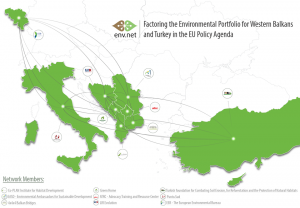
After 5 years of activity, the ENV-net today, counts for a member in each Instrument for Pre-accession Assistance country, this includes two newly joined organisations from Montenegro, and Bosnia and Herzegovina which co-operate with the network since 2016. The network is supported by partners in Italy – punto.sud and Belgium – European Environmental Bureau – EEB, both bringing to the network experience and best practices from two EU member states, as well as the possibility to align with similar ongoing initiatives within the EU.
Why ENV-net factoring the environmental portfolio for Western Balkans and Turkey in the EU Policy Agenda?
Recent natural occurrences such as repeated massive floods, and the EU accession obligations the Western Balkans and Turkey region must fulfil, highlight the immediacy of action required in the field of climate change and environmental protection.
For it to be effective, such action requires a solid pan-regional commitment in monitoring, advocating and awareness raising in home countries and engagement in policy- discussions at EU level. It also requires well-established and qualified civil society and media actors to generate positive pressure on the relevant institutions, and keep the citizens informed in a way that is accessible and actionable.
Studies show that, despite efforts made in this regard, the Western Balkan and Turkey region faces a number of challenges impeding progress, such as: limited local buy-in of the reforms, conflicting legislation, lack of a critical mass that can monitor developments and exert pressure on policy-makers, weak dialogue with institutions, poor understanding and coverage of climate change and environmental news, and very sparse resonance with current EU environment-related discussions such as circular economy aspects.
In response to these needs, ENV-net, as a proven regional network and advocacy actor, in the forthcoming three years will work on improving evidence-based policy-making and policy-influencing on climate change and environmental legislation in each of the ENV.net partner countries.
The network focus will be to generate region-representative evidence-supported input to contribute to EU discussions on matters of climate change and environment, and to explore and introduce to the region new inter-related aspects such as circular economy.
In the process, the network foresees to also technically and financially support civil society organisations and media in each of the network partner countries, to better understand and work on these issues.
The action is supported by the European Commission through the programme for Consolidating Regional Thematic Networks of Civil Society Organisations
ENV.net team is inviting you to follow and join efforts. Stay tuned!
Entering year 2017 with highlights from 2016: ENV.net project publications
A Guideline of EU Accession Monitoring Tools for CSOs in candidate and potential candidate countries: Chapter 27, (Authors and contributors: Andjelka Mihajlov, Natasa Zugic-Drakulic, Filip Jovanovic, Federico Bastia, Simona Pogliani, Mara Silina, Teida Shehi and Dusko Hristov), Published by Environmental Ambassadors for Sustainable Development with the financial assistance of the EU – ENV.net project document, Belgrade January 2015
How to influence environmental policy through effective advocacy (Authors: Margherita Tolotto and Mara Silina), ENV.net Advocacy Toolkit, European Environmental Bureau, Brussels, January 2015
Climate change and challenges of the enlargement (Authors: Anja Kolmuss, Dragana Mileusnic, Zanna Vanrenterghem and Richard Filcak), ENV.net Advocacy Toolkit, European Environmental Bureau, Brussels,September 2016
Global Review of Mercury Monitoring Networks
We provide our input on the first draft of the ’Global Review of Mercury Monitoring Networks’. We suggest to add visualized layer of locations “of burning of fossil fuel “ and “small scale mining” (or to make a reference if already exists at global scale).
The review is being developed within the framework of the project “Development of a Plan for Global Monitoring of Human Exposure to and Environmental Concentrations of Mercury”, funded by the Global Environment Facility. It seeks to compile and synthesize available information on existing mercury monitoring networks, including (i) air monitoring, (ii) human biomonitoring, and (iii) biota monitoring. It also seeks to highlight gaps in the coverage and scope of the monitoring networks. Thus the report aims to provide a baseline for future activities, including the promotion of further coordination and cooperation between the various networks.
The draft review will be submitted by UNEP Chemicals and Waste Branch to the interim secretariat of the Minamata Convention on Mercury in response to the first call for information of the seventh session of the intergovernmental negotiating committee on mercury (INC 7), which, among others, invited stakeholders to submit to the interim secretariat information on existing monitoring programmes and how they can contribute to an overall monitoring approach, including availability of baseline information.
EASD and ECOSOC signals: Achieving sustainable development through infrastructure
Infrastructure is a pre-requisite for advances across the 2030 Agenda for Sustainable Development, including for reducing poverty, promoting economic growth, addressing inequality and ensuring environmental sustainability. Infrastructure is addressed directly through SDG 9, which commits the international community to build resilient infrastructure, promote inclusive and sustainable industrialization and foster innovation. Moreover, “investments in sustainable infrastructure are recognized as a major cross-cutting driver that can contribute to achieving all the SDGs”, as stated by Under-Secretary-General for UN DESA, Wu Hongbo, at the 2015 Global Forum on Development. Resilient infrastructure is essential for ensuring sustainable development for all. “If we are to achieve our goals, and leave no one behind, we must address large infrastructure gaps in developing countries,” said Secretary-General Ban Ki-moon at the inaugural Global Infrastructure Forum in April 2016.
“Developing countries, particularly the most vulnerable, need international support to bridge existing infrastructure gaps,” emphasized Secretary-General Ban Ki-moon during the Global Infrastructure Forum. Infrastructure gaps pose major challenges to the implementation of the SDGs. The financing gap for infrastructure in developing countries, for example, is estimated to be 1 to 1.5 trillion dollars annually. Through the Addis Ababa Action Agenda (AAAA), the international community has committed to support resilient, sustainable infrastructure and to provide a comprehensive framework for mobilising the means to finance it.
Infrastructure that enables countries to adapt to and mitigate climate change is needed to support the Paris Climate Change Agreement. New and resilient infrastructure is also needed to support sustainable urbanization, as the number of people living in cities in emerging economies is expected to double by 2030. Resilient infrastructure is needed, moreover, to cope with the increasing incidence and magnitude of natural disasters.
In recent years there have been several new global, regional and national initiatives aimed at increasing investment in infrastructure. In Africa, for example, infrastructure is a priority element for realizing the vision of Africa’s Agenda 2063. At the global level, the international community committed to support the realisation of resilient, sustainable infrastructure through the AAAA, and created a new Global Infrastructure Forum—which held its inaugural meeting in April—to facilitate access to financing and technical expertise.
The global discussion on infrastructure will continue on 21 July 2016 at UN Headquarters as part of ECOSOC’s 2016 thematic discussion on “Infrastructure for sustainable development for all”. The thematic discussion, part of ECOSOC’s High-level Segment, will engage a broad range of voices in a global dialogue on infrastructure for sustainable development that is inclusive and leaves no one behind. It will offer policy recommendations and inform the Inter-agency Task Force report on Financing for Development, as well as the 2017 Global Infrastructure Forum. For more information: UN Economic and Social Council (ECOSOC)
EASD already is addressing the issue of environmental infrastructure as the condition for sustainable development ( 1 , 2 , 3….), as well as by research and promotion ( A, B, C , …)
SDGs as the relevant part of the context within which FEE operates
After a long series of intergovernmental negotiations on various themes,which saw a broad participation from major groups and civil society stakeholders under the guidance of the United Nations State Members, the Goals have been adopted on September 25th at the New York United Nations Summit by 193 Member States. In the same occasion, the UN launched their post-2015 development agenda, in which the Goals are integrated. UN Member States, the civil society and private sector contributors will use this new, universal set of goals, targets and indicators to guide development global efforts over the next 15 years in a concerted international action within the broadest, most ambitious development agenda ever agreed at the global level. The 17 Goals and 169 Targets are meant to be action-oriented, concise and easy to communicate, aspirational, global in nature and universally applicable to all countries, while taking into account the different national realities, capacities and levels of development and respecting national policies and priorities.
The Foundation for Environmental Education with its global network thus needs to frame and highlight its role as a stakeholder and trendsetter in the Sustainable Development process, particularly for environmental, educational and eco-tourism matters. The SDGs will define a relevant part of the context within which FEE operates, thus we are driven to reflect our work in the Goals.
FEE through its mission of fostering awareness, knowledge, participation, commitment, skills, actions and creativity on the environment and on sustainable development, shares the core values behind the set of SDGs. The programmes based on Education for Sustainable Development, such as YRE, Eco-Schools and LEAF show a strong link with the educational Goal (SDG 4) and the Goal on global partnership for sustainable development (SDG 17). FEE’s tourism eco-labels, Green Key and Blue Flag, on the other hand, have a focus on making human settlements inclusive, safe, resilient and sustainable (SDG 11) and on implementing tools for monitoring sustainable development impacts for tourism (SDG 12.b).
Thus, FEE as an umbrella organisation aims at reaching objectives as indicated in the SDGs:
– “Ensure healthy lives and promote well-being for all at all ages” (SDG 3).
– “Ensure inclusive and equitable quality education and promote life-long learning opportunities for all” (SDG 4).
– “Ensure availability and sustainable management of water..” (SDG 6),
– “Ensure access to affordable, reliable, sustainable, and modern energy for all” (SDG 7),
– “Conserve and sustainably use the oceans, seas and marine resources for sustainable development” (SDG14), as well as to
– “Protect, restore and promote sustainable use of terrestrial ecosystems..” (SDG 15).
– “Promote sustained, inclusive and sustainable economic growth..” (SDG 8), particularly to “..Implement policies to promote sustainable tourism which creates jobs, promotes local culture and products” (SDG 8.9).
– “Make cities and human settlements inclusive, safe, resilient and sustainable” (SDG 11).
– “Ensure sustainable consumption and production patterns” (SDG 12).
– “Take urgent action to combat climate change and its impacts” (SDG 13).
– “..Promote sustainable use of terrestrial ecosystems..” (SDG 15).
– “Promote peaceful and inclusive societies for sustainable development..” (SDG 16), particularly to build transparent institutions and promote non-discriminatory policies for sustainable development (SDGs 16.6, 16.b) with a positive, proactive, democratic modus operandi and a strong synergic support to civil society and third sector.
– “Strengthen the means of implementation and revitalize the global partnership for sustainable development” (SDG 17) through a geographically spread, multi-stakeholder approach.
Programmes’ overview:
a) YRE: Young Reporters for the Environment is a network of international youth engaged in environmental journalism and Education for Sustainable Development, where the students investigate an environmental problem and report it to the local community, while, at the international level, they may cooperate with young reporters from other countries for sharing information or data, with the aim of proposing a solution and disseminating it.
The most evident link between the Young Reporters for the Environment programme and the SDGs is found in the Goal 4:
“Ensure inclusive and equitable quality educationand promote lifelong learning opportunities for all” and its subparagraphs“..increase … the number of youth and adults who have relevant skills, including technical and vocational skills, for employment, decent jobs and entrepreneurship” (SDG 4.4) with the aim of learning to think critically, “ensure all learners acquire knowledge and skillsneeded to promote sustainable development, including among others through education for sustainable development and sustainable lifestyles, human rights, gender equality, promotion of a culture of peace and non-violence, global citizenship, and appreciation of cultural diversity and of cultures contribution to sustainable development” (SDG 4.7) for being able to connectwith concrete issues.
The environmental educational programme thus also wish for taking “action to combat climate change and its impacts” (SDG13), specifically for what concerns to “improveeducation, awareness raising and human and institutional capacity on climate change mitigation, adaptation, impact reduction, and early warning” (SDG 13.3) through active solution-oriented learning. The programme canalso help to“promote mechanisms for raising capacities for effective climate change related planning and management, in LDCs, including focusing on women, youth, local and marginalized communities” (SDG 13.b).
YRE is a network of young people educating for sustainable developmentand environmental issues in general, thus it also supportsthe aim of many other SDGs, such as:
“Promotesustainable agriculture” (SDG 2).
“Promote well-beingfor all at all ages” (SDG 3).
“Achieve gender equality and empowerall womenand girls” (SDG 5).
“Ensure availability and sustainable management of waterand sanitation for all”, supporting and strengthening the participation of local communities (SDG6)
“Ensure access to affordable, reliable, sustainable, and modern energyfor all”(SDG7)
“Promotesustained, inclusive and sustainable economic growth, full and productive employment and decent work for all”, developing measures that support creativity and innovation (SDG8)
“Build resilient infrastructure, promoteinclusive and sustainableindustrializationand fosterinnovation”enhancing scientific research (SDG9)
“Make cities and human settlements inclusive, safe, resilient and sustainable … Reduce the adverse per capita environmental impact of cities, including by paying special attention to air quality, municipal and other waste management”(SDG 11)
“Ensure sustainable consumption and production patterns”, raising awareness on sustainable development and lifestyles which are in harmony with nature (SDG12)
“Conserve and sustainably use the oceans seas and marine resources for sustainable development”, aiming to preventmarine pollution and protectmarine and coastal ecosystems (SDG14)
“Protect, restore and promote sustainable use of terrestrial ecosystems, sustainably manage forests, combat desertification, and halt and reverse land degradation and halt biodiversity loss”, promoting the implementation of sustainable management of the forests (SDG15)
YRE helps to “Promotepeaceful and inclusive societies for sustainabledevelopment..”(SDG16)
YRE can encourage to “..Revitalize the global partnership for sustainable development” (SDG17)
The journalistic piece can influence the local communities to take action on various environmental matters
b) ECO-SCHOOLS: A global student-led change process in Education for Sustainable Development which involves also teachers’ training, integration in the school curriculum, environmental reviews, action plans, monitoring and evaluation, informing and involving the local community, setting an eco-code focusing on the various environmental themes (water, energy, waste, global citizenship..).
The programme is fully in line with the Goals:
“Ensure inclusive and equitable quality education and promote lifelong learning opportunities for all” increasing the number of youth and adults with relevant skills and ensuring that all learners acquire knowledge for promoting sustainable development, developinga culture of peace and global citizenship while upgrading education facilities to child, disability and gender sensitive ones as to provide a safe, inclusive and effective learning environment for all(SDG 4)
“Make cities and human settlements inclusive, safe, resilient and sustainable”, strengthening efforts to safeguard the world’s cultural and natural heritagewith a focus on schools’ waste management, resource efficiency and climate change mitigation (e.g. Litter Less Campaign) (SDG 11)
“Strengthen the means of implementation and revitalize the global partnership for sustainable development” (SDG 17).
The implementation of the Eco-Schools programme also works towards the achievement of the aim of more SDGs, such as:
“Ensure healthy lives and promote well-beingfor all at all ages” (SDG 3)
“Ensure availability and sustainable management of water and sanitation for all”, improving water quality and water-use efficiency with pollution reduction, minimizing the release ofhazardous chemicals, halving the proportion of untreated wastewater,increasing recycling or safe reuse and ensuring sustainable withdrawals together with the strengthening of the participation of local communitiesfor such purposes (SDG 6)
“Ensure access to affordable, reliable, sustainable, and modern energy for all” increasing the share of renewable energy and energy efficiency, with the result of creating also savings (SDG 7)
“Promote sustained, inclusive and sustainable economic growth, full and productive employment and decent work for all”with the improvement of resource efficiency in consumption and production as to endeavour to decouple economic growthfrom environmental degradation (SDG 8)
“Build resilient infrastructure, promote inclusive and sustainable industrialization and foster innovation” (SDG 9)
“Ensure sustainable consumption and production patterns”, using the natural resources efficiently, reducing the waste generation (including the food waste) and managing sustainably the chemical products (SDG 12)
“Take urgent action to combat climate change and its impacts”specially improving education, awareness raising and capacity on climate change mitigation, adaptation, impact reduction and early warning (SDG 13)
“Protect, restore and promote sustainable use of terrestrialecosystems..” (SDG 15)
“Promotepeacefuland inclusivesocietiesfor sustainable development… and build effective, accountable and inclusive institutions at all levels” highlighting the theme ofsocial justice(SDG 16).
c) LEAF: Learning About Forests wants to encourage environmental education through awareness raising among students, teachers and the wider school community, to increase knowledge about the key role forests play for sustainable life on our planet, reflecting their cultural, ecological, economic and social functions, with themes as biodiversity, climate, products or services, codes and myths.
The key Goals linked to the Learning About Forests programme are:
“Ensure inclusive and equitable quality education and promote lifelong learning opportunities for all”, increasing the number of youths and adults who have relevant skills and ensuring that all learners (referring to the whole school community) acquire knowledge and skills needed to promote sustainable development, including through education for sustainable development and lifestyles in harmony with nature (SDG 4)
“Ensure availability and sustainable management of water..”, protecting water-related ecosystems and supporting the participation of local communitiesfor improving water management(SDG 6)
“Protect, restore and promote sustainable use of terrestrial ecosystems, sustainable manage forests, combat desertification, and halt and reverse land degradation and halt biodiversity loss”, ensuring a sustainable use of terrestrial and inland freshwater ecosystems and their services, including their biodiversity, in particular forests, wetlands mountains and drylands, preventing the extinction of threatened species(SDG 15)
The principles behind LEAF are compatible with the aim of more SDGs:
“End hunger, achieve food security and improved nutrition, and promotesustainable agriculture”, implementing agricultural practices, such as the tree-planting events, which help maintain ecosystems and progressively improve land and soil quality (SDG 2)
“Ensure healthy lives and promote well-being for all at all ages” (SDG3)
“Ensure access to affordable, reliable, sustainableand modern energyfor all” (SDG7)
“Promote sustained, inclusive and sustainable economic growth, full and productive employment..”, endeavouring to decouple economic growth from environmental degradation and devising policies that encourage sustainable tourism which promotes local culture and products, such as jobs related to the forest, while learning to respect the forest community as well as its myths, laws and codes (SDG8)
“Make cities and human settlements inclusive, safe, resilient and sustainable”, strengthening efforts to protect and safeguard the world’s cultural and natural heritage while supporting positive links between the urban and the rural areas as to widen the access to inclusive green and publicspaces (SDG11)
“Ensure sustainable consumption patterns” through relevant information and awareness for achieving sustainable management and efficient use of natural resources (SDG12)
“Take urgent action to combat climate change and its impacts” improving education and awareness raising on climatechange and the role of forests (SDG13)
“Strengthen the means of implementation and revitalize the global partnership for sustainable development” (SDG17).
d) BLUE FLAG: The world’s biggest voluntary eco-label for beaches, marinas and eco-tourism boats works towards sustainable development through compliance with criteria dealing with environmental education and information, environmental management, water quality, safety and other services.
The principles and rules of the programme comply with the content of many Goals:
“Ensure availability and sustainable management of water and sanitation for all”, improving water quality with pollution reduction and minimization of hazardous chemicals release, increasing recycling, safe reuse and water-use efficiency through the usage of sustainable withdrawals as to protect water-related ecosystems also with the support and participation of local communities (SDG 6)
“Promote sustained, inclusive and sustainable economic growth, full and productive employment and decent work for all”improving the resource efficiencyin consumption while devising and implementing policies to promote sustainable tourism which creates job, promotes local culture and products.Blue Flag focuses as well on the protection of labour rights together with the promotion of a safe and secure working environment and the prohibition of child labour (SDG 8)
“Build resilient infrastructure..”upgrading it as to be sustainable and equipped with clean technologies (SDG 9)
“by 2030 empower and promote the social, economic and political inclusion of all irrespective of age, sex, disability, race, ethnicity, origin, religion or economic or other status”with the aim of reducing inequalities and discriminatory practices for wages as social protection policies (SDG 10.2)
“Make cities and human settlements inclusive, safe, resilient and sustainable”enhancing capacities for participatory and sustainable human settlements as to strengthen the efforts for safeguarding the world’s cultural and natural heritage while providing universal access to the public spaces particularly for women and children, older persons and persons with disabilities(SDG 11)
“Ensure sustainable consumption and production patterns”for the efficient use of natural resources, through a sound management and reduction of chemicals and wastes and the promotion of sustainable public procurement practices (SDG 12)
“Conserve and sustainably use the oceans, seas and marine resources for sustainable development”preventing and reducing marine pollutionalso from land-based activities, addressing the impacts of ocean acidification and conserving coastal and marine areas. Blue Flags also contributes in increasing the economic benefits to SIDS and LDCs with the sustainable use of marine resources through tourism (SDG 14)
“Protect, restore and promote sustainable use of terrestrial ecosystems… halt and reverse land degradation and halt biodiversity loss” for halting the loss of biodiversity and preventing the extinction of threatened species, also through the integration of ecosystem values into local planning policies (SDG 15).
The implementation of the Blue Flag programme also work towards the aim of several more SDGs:
• “Ensure healthy lives and promote well-being for all at all ages” (SDG3)
• “Ensure inclusive and equitable quality education and promote lifelong learning opportunities for all”as education has a central role in the programme and reaches out for all the persons involved in it as well as for theusers (SDG4)
• “Achieve gender equality and empower all women and girls”(SDG5)
• “Ensure access to affordable, reliable, sustainable,and modern energy for all” to help increasing the share of renewable energy and energy efficiency(SDG7)
• “Take urgent action to combat climate change and its impacts”(SDG 13)
• “Promote peaceful and inclusive societies for sustainable development..”enforcing non-discriminatory policies for sustainable development (SDG16)
• Strengthen the means of implementation and revitalize the global partnership for sustainable development”through a multi-stakeholder partnership, which involves also public partnersand local authorities,where knowledge and expertise are shared (SDG17)
e) GREEN KEY: This eco-label for tourism facilities (hotels, campsites, small accommodations, tourist attractions and restaurants) is a voluntary award that aims at contributing to prevent climate change and reach sustainable tourism by awarding and promoting best practice, with the goal of changing the environmental practices at the awarded establishments but also the behaviour of tourism actors, including guests, staff, suppliers, authorities, local communities so to involve them in increasingly safeguarding their own environment. The focus is on themes such as environmental management, water, waste and energy saving, involvement and awareness of guests and staff, management of food and beverage and open spaces.
For what concerns the part of the programme related to environmental management, the Goals mainly involved are:
“Ensure … sustainable management of water..” improving its quality, having the proportion of untreated wastewater, increasing recycling, safe reuse and sustainable withdrawals of freshwater (SDG 6)
“Build resilient infrastructure, promote inclusive and sustainable industrialization and foster innovation”setting rules for developing or upgrading quality infrastructures to support economic development and human well-being for an increased resource use efficiency and greateradoption of clean technologies (SDG 9)
“Make … human settlements inclusive, safe, resilient and sustainable”paying attention to air quality, indoor environment and waste management as to tackle climate change(SDG 11)
“Ensure sustainable consumption and production patterns”with rules for achieving sustainable management of natural resources,respecting eco-criteria for food and beverages, reducing waste generationand achieving environmentallysound management of chemicals (SDG 12).
This way the programme “develops and implements tools to monitor sustainable development impacts for sustainable tourism which creates jobs, promotes local culture and products” (12.b).
As an eco-tourism programme focused on the environmental awareness of staff and guests, the Goals principally involved are:
“Ensure healthy lives and promote well-being..” where the programme has to encourage the users to take part in green activities (SDG 3)
“..ensure all learners acquire knowledge and skills needed to promote sustainable development, including among others through education for sustainable development and sustainable lifestyles, human rights..” as part of the “educational Goal” (number 4), whereby the learners are the recipients of the environmental information expected in the implementation of the programme (SDG 4.7)
“Promote sustained, inclusive and sustainable economic growth, full and productive employment and decent work for all”, as the Green Key programme sets Corporate Social Responsibility and safety rules for the workers(SDG 8)
“Take urgent action tocombat climate change and its impacts”through a reduced environmental impact but also through the improvement of education and awareness raising for both the facilities’ staff and users (SDG 13)
“..revitalize the global partnership for sustainable development” (SDG 17).
Post Rio+20 busy July 2015
29 June 2015, UN Headquarters, New York, HLPF Stakeholder Consultation: This event present the results of an international stakeholder consultation on the mandate and means of stakeholder engagement in the HLPF.The High-Level Political Forum on Sustainable Development (HLPF) is proposed as the institutional “home” for follow-up and review of the post-2015 development agenda; and therefore presents a critical entry-point to ensure delivery of the post-2015 agenda and sustainable development more broadly.
26 June – 8 July 2015, UN Headquarters, New York, High-Level Political Forum on Sustainable Development (The 2015 meeting of the High-Level Political Forum on Sustainable Development (HLPF) under the auspices of the UN Economic and Social Council (ECOSOC)): The theme of the meeting is “Strengthening integration, implementation and review – the HLPF after 2015.” The first part of the meeting consist of moderated dialogues on a variety of issues, including how to move from vision to transformative action, the role of the private sector in implementation, how the HLPF can support national action, involvement of scientific communities in implementation, regional support for national implementation, small island developing states (SIDS) and investment in sustainable development. The second part of the meeting comprise a ministerial segment, which is expected to include dialogues on developing a transformative integrated agenda, emerging issues for the future, communicating and implementing a universal agenda, shaping the HLPF for the next 15 years, reviewing and monitoring progress, realizing the sustainable development goals (SDGs), and transitioning from the Millennium Development Goals (MDGs) to the SDGs.
EASD is pleased to share with you document: Towards an Integrated and Inclusive Follow-up and Review of Natural Resources. Two recommendations aim to ensure that the effective follow-up and review of natural resources in the post-2015 development agenda is aligned with the principles of integration, participation and inclusion: 1) Thematic reviews of natural resources as a crosscutting issue, from tenure to their use, should be carried out under the HLPF; 2) National multi-stakeholder and rights-holder initiatives for follow-up and review, within the context of a renewed global partnership for development, should be established or strengthened.
20-22 July 2015, Economic and Social Council Meeting: Will consider and take action on the Committee’s recommendation at its Coordination and Management Meeting. The Committee on Non-Governmental Organizations at its 2015 Resumed Session, held from 26 May to 3 June 2015, decided to recommend Special consultative status with the Economic and Social Council to our organization EASD – Environmental Ambassadors for Sustainable Development.
Indicators and a Monitoring Framework for Sustainable Development Goals
The Sustainable Development Solutions Network (SDSN) has recently published its final report on Indicators and a Monitoring Framework for the Sustainable Development Goals: Launching a data revolution for the SDGs. This report is the result of over 18 months of consultations led by the SDSN with the contributions of nearly 500 organizations and thousands of individuals – draft versions of the report have so far been downloaded over 80000 times.The report outlines a tiered monitoring framework at the national, global, regional, and thematic levels, and presents a concise set of 100 Global Monitoring Indicators. This limited number of indicators can comprehensively track all 169 OWG targets while balancing countries’ capacities and domestic monitoring commitments. This report is a contribution to the ongoing post-2015 processes, including the Inter-Agency and Expert Group on the SDGs (IEAG-SDGs).
Environmental Ambassadors for Sustainable Development is the Member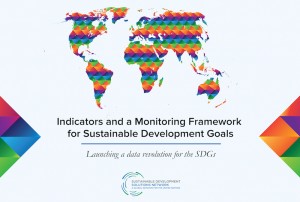 of the Sustainable Development Solutions Network – SDSN .
of the Sustainable Development Solutions Network – SDSN .
We follow Informal interactive hearings with representatives of NGOs, CSOs, major groups and the private sector on the post-2015 development agenda, in NY.
One more publication , as the outreach in Rio+20 process is 2015 Food Security Report, with key findings : – For the world as a whole, the MDG 1 indicators for prevalence of undernourishment and underweight children under 5 years of age have largely moved in parallel, providing a consistent message regarding achievement of the hunger target; – Underweight in children is expected to decline less rapidly than undernourishment, given that better hygiene conditions, access to clean water and more varied diets usually require more investment and more time to materialize than enhanced availability of calories: – Despite showing rapid reduction, Southern Asia is the region with the highest historical prevalence of underweight children among the developing regions; – In sub-Saharan Africa, there has been limited progress in reducing both undernourishment and child underweight; – Economic growth is necessary for sustaining progress in efforts to reduce poverty, hunger and malnutrition. But it is not sufficient; – Inclusive growth – growth that provides opportunities for those with meagre assets, skills and opportunities – improves the incomes and livelihoods of the poor, and is effective in the fight against hunger and malnutrition; – Improving the productivity of resources held by family farmers and smallholders is, in most cases, an essential element of inclusive growth and has broad implications for the livelihoods of the rural poor and for the rural economy in general; – In many situations, international trade openness has an important potential for improving food security and nutrition by increasing food availability and for promoting investment and growth; – Social protection directly contributes to the reduction of hunger and malnutrition by promoting income security and access to better nutrition, healthcare and education; – Prevalence of food insecurity and malnutrition is significantly higher in protracted crisis contexts resulting from conflict and natural disasters. For more information
Toxic pesticide globally banned after (un)precedented vote at UN meeting on chemicals
Delegates from more than 90 countries took the unprecedented step of voting for a global ban on pentachlorophenol – a proven toxic pesticide and contaminant found in wildlife and human biomonitoring studies worldwide. The historic vote came at the combined meetings of the Basel, Rotterdam, and Stockholm Conventions – which usually make decisions by consensus – after India repeatedly blocked action.
The delegates of the Stockholm Convention also supported international bans on two other industrial chemicals that harm the global environment and human health: chlorinated naphthalenes and hexachlorobutadiene.
Eco-schools National Operators Meeting 2014
This year’s NOM took place in Cardiff, from 4th to 6th Decemeber, and was organized by Keep Wales Tidy team in the premises of Maldron hotel. Workshops, presentations, group discussions and many interesting sessions made all participating National Operators fully involved.
After the warm welcome from Lesley Jones, Chief executive of Keep Wales Tidy, Laura Hickey (Member of the Board with responsibilty for Eco-Schools) introduced Peter Davis – Wales’ Commissioner for Sustainable Futures. Sessions related to 7 steps were being introduced either by Brid Conneely, International Eco-Schools Director or Laura Hickey and facilitated by Team Wales. Several Eco-Schools’ showcases presented the good practice in Welsh schools. The Environmental review session, Action planning, Monitoring and evaluation, Social media connections, 21st century skills: linking to the classroom and Eco-Schools report session were followed by FEE Environmental education principles presentation and group work. Decade for ESD, conference update, was given by Lesley Jones, Yukiko Tsuburaya, Kenza Khallafi and Paul Pace. FEE’s new flags supplier, Semaphore, introduced themselves. Conference dinner was served in the beautiful banquet hall of Cardiff Castle. Young Reporters for the Environment were involved in the Meeting as well.
NOM was filled with positive attitude and cooperation, sharing of knowledge, experience and fresh ideas among operators. Many attendees returned to their home countries with precious suggestions and materials for further improvements of the Programme after successful 20 years.
Dragana Grujičić
ECF TRAINING MODULE 1 TECHNICAL ASPECTS OF THE EU ACCESSION PROCES
TRAINING MODULE 1
TECHNICAL ASPECTS OF THE EU ACCESSION PROCES: IMPROVING THE KNOWLEDGE BASE ON SCOPE AND OPPORTUNITIES FOR CIVIL SOCIETY INVOLVEMENT
Date: Nov 20-21, 2014
Place: Premier Best Western Hotel Conference Center, Podgorica, Montenegro
Draft Agenda Outline
Day 1: 20 Nov, 2014
| Start | Finish | Topic | Facilitator/Speaker | Sub topic/Content |
| 08:30 | 09:00 | Registration and coffee | ||
| 9.00 | 09.10 |
Opening |
Richard Filcak, ECRAN ECF Expert |
Welcome/agendaECRAN and civil society involvement
Introduction of the participants and keynote speakers |
| 09.10 | 09.30 | Address by the Ministry of Sustainable Development and Tourism |
Ivana Vojinovic, Assistant Minister, Ministry of Sustainable Development and Tourism |
Reflections on the progress of Montenegro in the EU enlargement process and role and involvement of the civil society |
| 9.30 | 10.00 | The EU enlargement and the civil society |
Alberto Cammarata, Head of Political Section in the EU Delegation to Montenegro |
The EU enlargement process and involvement of the civil society: goals and experience |
| 10.00 | 11.00 |
West Balkan, Turkey and the enlargement process |
Mihail Dimovski, ECRAN Team Leader |
ECRAN experience from progress monitoring and project activities: Situation, challenges and opportunities for public participation |
| 11.00 | 11.30 | Coffee Break | ||
| 11.30 | 12.30 | NGOs opportunities to contribute to country EU accession process |
Andjelka Mihajlov, ECRAN ECF expert
|
Accession to the EU and Negotiation with the EU (Chapter 27): 1. Accession steps, 2. Progress Monitoring, and 3. Negotiation |
| 12.30 | 13.30 | Lunch | ||
| 13.30 | 14.15 | Civil society and the enlargement – new member state experience | Fedor Cerne, ex member of negotiation team for Slovenia | The EU accessions and civil society involvement: Slovenian experience |
| 14.15 | 15.00 | EU accesion and Croatia: NGO perspective | Zeljka Leljak Gracin, Green Action Croatia | NGO perspective on the most recent EU enlargement: Lessons learned |
| 15.00 | 15.30 | Coffee Break | ||
| 15.30 | 16.30 | Negotiations and public involvement – Country experience Montenegro | Olivera Kujundzic, Ministry of Sustainable Development and Tourism, MontenegroNatasa Kovacevic – Green Home Montenegro | Experience from the enlargement process in Montenegro: existing models for cooperation with CSOs, challenges and future perspectives |
| 16.30 | 17.00 | Closing of the day | Richard Filcak, ECRAN Expert | Wrap up of the day, key issues for the 2nd day, AOB |
Day 2: 21 Nov, 2014
| Start | Finish | Topic | Facilitator/Speaker | Sub topic/Content |
| 9:00 | 9:30 |
Opening |
Richard Filcak, ECRAN ECF Expert |
Summary of topics discussed day 1, goals of the day 2 |
| 9:30 | 10:30 | Strategic Planning and public involvement | Nadya Boneva, ECRAN Expert | The main needs of the approximation process, role of strategic planning in organising approximation process, experience from old and new Member States and Candidate Countries, the most important planning documents for the approximation process. |
| 10.30 | 11.00 | Coffee Break | ||
| 11.00 | 13.00 | Advocacy and the EU enlargement – short introFocusing the future (Group Work) | Richard Filcak and Lidija Zivcic, FOCUS Slovenia | Starting from SWOT, groups of NGOs identify key issues and challenges, outline strategic plans for the upcoming period and present their strategies reflecting inputs from the training |
| 13.00 | 14.00 | Lunch | ||
| 14.00 | 15.00 | Civil society and the enlargement process– Panel Discussion with short intro inputs from ECRAN and NGO experts presented | Moderator to be confirmed | Experiences, lessons learned and key messages for the NGO involvement |
| 15.00 | 15.30 | Wrap up, open issues for the future and evaluation | Richard Filcak, ECRAN Expert | Revisiting key issues, discussion on drivers, barriers and challenges and future of the EU accession process |
| 15.30 | Departure | |||
Agenda for EnE14/ENV.net Conference “Environment to Europe”, June 5, 2014 in SCC – opening at 10:00
Conference Agenda
5. juni June 5th
| Velika sala u PKS, Resavska 15 | Serbian Chamber of Commerce, Resavska 15 |
9:00 – 9:45 Registracija učesnika /Registration
9:45 – 10:00 Preparation to opening sharp at 10:00 / Priprema da otvaranje bude sa početkom tačno u 10h
10:00 – 11:00 Uvodna obraćanja sa uručivanjem Zahvalnica za partnerstvo “Životna sredina ka Evropi” / Opening remarks with handing out Recognitions for “Environment to Europe” partnership
Predsedništvo: Siniša Mitrović, prof.dr Andjelka Mihajlov , prof.dr Nataša Žugić-Drakulić, Dušan Stokić, doc. dr Dunja Prokić
- Irena Vojáčková – Sollorano, UN Resident Coordinator / Visoki predstavnik UN u Srbiji
- Freek Janmaat, Head of European Integration and Economic Section, Delegation of the European Union to the Republic of Serbia, Direktor sektora za evropske integracije i ekonomiju, Delegacija Evropske unije u Republici Srbiji
- Gabriela Bennemann, Head of department for economy and trade at the German Embassy in the Republic of Serbia, Rukovodilac ekonomskog odeljenja nemačke ambasade u Republici Srbiji
- Stana Božović, State Secretary for Environment, Ministry for Agriculture and Environmental Protection/državna sekretarka za životnu sredinu (tbfc)
- Filip Radović, Head of Serbian Environmental Protection Agency – Ministry for Agriculture and Environmental Protection , Direktor Agencije za zaštitu životne sredine Republike Srbije-Ministarstvo poljoprvirede i zaštite životne sredine Republike Srbije
- Rodolјub Šabić,The Commissioner for Information of Public Importance and Personal Data /Poverenik za informacije od javnog značaja i zaštitu podataka o ličnosti Vlade Srbije
- Representative of the Government of Serbia’s Office for EU integration, Predstavnik Kancelarije za evropske integracije Vlade Srbije
- Željko Sertić, Serbian Chamber of Commerce President / Predsednik Privredne komore Srbije (tbc)
- Representative of SCC Commity of Environment and Sustainable Development/ Predstavnik Odbora za životnu sredinu i održivi razvoj PKS
- Snežana Radočaj, Head of Hemofarm Foundation/Direktorka Fondacije Hemofarm
- Aleksandar Dragišić, Head of Institute for nature conservation of Serbia/Direktor Zavoda za zaštitu prirode Srbije
- Prof. dr Stevan Lilić, Public Policy Institute Podgorica/Beograd/Ljubljana, Institut za javnu politiku Podgorica/Beograd/Ljubljana
- Saša Mihajlović,Green Serbian Chamber of Commerce President/ Predsednik Privredna komora Zelene Srbije
- Tatjana Trifunov, JP “Ada Ciganlija” Beograd
- Represebntative of OSCE in Serbia / Predstavnik OEBS u Srbiji
- Maja Spasojević, Head of Environmental Management, Health, Energy and Agriculture Department, EPTISA Regional Office for SEE, Eptisa Regional Office for SEE/ Direktor sektora zivotne sredine, energetike, zdravlja i poljoprivrede, EPTISA Regionalna kancelarija za jugoistocnu Evropu
- Prof.dr. Anđelka Mhajlov, Introductory message: Importance and Institutional set up in Serbia for Chapter 27 negotiation with EU / Uvodna poruka: Važnost i institucionalno organizovanje u Srbiji za pregovaranje poglavlja 27 sa EU
Note/Napomena: Pending invitation will be included in the final Agenda upon confirmation/ Uvaženi pozvani gosti će biti uvršćeni u finalni dnevni red, po dobijanju potvde učešća
11:00 -11:10 Technical Break / Tehnička pauza
11:10- 13:00 Plenary lectures / Plenarna predavanja
(Moderatori: Prof dr Hristina Stevanović-Čarapina, Prof. Dr. Predrag Simonović, Prof. Dr. Zora Dajić-Stevanovć, Draženko Bijelič, Milica Petrović)
Negotiating chapter 27: process and challenges, Arunas Kundrotas, Senior adviser on EU integration, ENVAP project, Jovana Majkic, Coordinator of Negotiaton Group 27, Ministry of Agriculture and Environmental Protection
EMAS III – DOBRODOŠLI U EU! / EMAS III – WELCOME TO EU!, DRAGANA PETROVIĆ, VICTORIA CONSULTING D.O.O./ EMAS NACIONALNI EKSPERT NA PROJEKTU EU: LAW ENFORCEMENT IN THE FIELD OF INDUSTRIAL POLLUTION CONTROL, PREVENTION OF CHEMICAL ACCIDENTS AND ESTABLISHING THE EMAS SYSTEM IN SERBIA,EUROPEAID/131555/C/SER/RS., BEOGRAD
CLIMATE CHANGE AND ECONOMY: TOURISM ASPECTS FOR GREECE, A.V. Michailidou, Ch. Vlachokostasa, Ch.-T. Tsourdioua, D. Spyridia, G. Baniasb, Ν. Moussiopoulosa, Laboratory of Heat Transfer and Environmental Engineering, Aristotle University Thessaloniki; School of Economics and Business Administration, International Hellenic University, Thermi, Greece
Multi-criteria Prioritization of the Flood Management Projects in Republica Srpska using PEPA Methodology, Merih Kerestecioglu, Mihajlo Stevanović, Ljiljana Stojić, Vassilis Evmopidis, COWI IPF Consortium ,Ministry of Agriculture, Forestry and Water Management of Republika Srpska
Aktivnosti Zavoda za zaštitu prirode Srbije u oblasti zaštite prirode, Poglavlje 27, Verica Stojanović, član radne grupe za Poglavlje 27
ENV.net PROJEKAT : NAPREDAK I IZAZOVI / ENV.net Project: Progress and Chalanges, Nataša Žugić-Drakulić i Filip Jovanović, Naconalna koordinatorka i asistent projekta Development of ENV.net in West Balkan and Turkey: giving citizens a voice to influence the environmental process reforms for closer EU integration – Ambasadori održivog razvoja i životne sredine/Environmental Ambassadors for Sustainable Development
Moj izbor, moje pravo–zdrava životna sredina!, Zorica Stevanović, Centar za razvoj građanskog društva “PROTECTA”, Niš
Vrste biljaka i životinja značajnih za zaštitu prirode u EU, Gabor Mesaroš, Udruženje za zaštitu i razvoj okruženja i graditeljskog nasleđa – Protego, Subotica
13:00-14:00 Break with buffet / Pauza sa posluženjem
14:00-14:15 Zajedničko fotografisanje dobitnika Priznanja za partnerstvo “Životna sredina ka Evropi” / Group Photo of awarded with Diploma for Partnership Recognition), Spisak na kraju Agende/List of awarded is included in the Agenda
14:15-17:00 Nastavak plenarnih predavanja – Plenary presentation continuation
(Moderatori: Milica Petrović, Draženko Bijelić, Uroš Rakić, Milena Tabašević, Radmila Marjanov-Panjević, Nataša Žugić Drakulić)
Učestalost prekoračenja GV PM10 – poređenje stanja kvaliteta vazduha u Republici Srbiji i EU, Anđelka Radosavljević, Tihomir Popović, Lidija Marić Tanasković, Biljana Jović, Agencija za zaštitu životne sredine
MEĐUNARODNI PROPISI O UČEŠĆU JAVNOSTI U DONOŠENJU ODLUKA I REPUBLIKA SRBIJA, TINA JANJATOVIĆ, MINISTARSTVO POLJOPRIVREDE I ZAŠTITE ŽIVOTNE SREDINE , DRAGOLJUB TODIĆ, INSTITUT ZA MEĐUNARODNU POLITIKU I PRIVREDU, BEOGRAD
SRBIJA U PROCESU EVROPSKIH INTEGRACIJA I ZNAČAJ PRIMENE EMS U ORGANIZACIJAMA LOKALNE SAMOUPRAVE, Novica Staletović, Nataša Borojević, Violeta Ćulibrk, Srđan Kovačević, UnivErzitet Union-Nikola Tesla, Fakultet za ekologiju i zaštitu životne sredine, Beograd; SO Plandište: EPS JP PK, Beograd
REZULTATI I PROBLEMI U SPROVOĐENJU IPA PROGRAMA PREKOGRANIČNE SARADNJE OD ZNAČAJA ZA OBLAST ŽIVOTNE SREDINE I POGLAVLJE 27, MLADENKA IGNJATIĆ, DRAGOLJUB TODIĆ, ISTRAŽIVAČKI FORUM EVROPSKOG POKRETA U SRBIJI
Izlaganja/Presentations
Promena ekološke svesti građana Bora od LEAP-a 2003. do LEAP-a 2013, Dragan Ranđelović, Milan Trumić, Toplica Marjanović, Ljiljana Marković Luković, Maja Trumić, Društvo mladih istraživača Bor
Application of geographic information system (GIS) in environmental monitoring, Uroš Rakić, Institut zа јаvnо zdrаvljе Srbiје „Dr Milаn Јоvаnоvić Bаtut” Beograd
Assessing Territorial Attractiveness in South East Europe/Ocena atraktivnosti teritorija Jugoistocne Evrope, Projekat, Blaž Barborič, Geodetski institut Slovenije, Republička agencija za prostorno planiranje
Eko-standardi kao konkurentska prednost u hotelijerstvu i turizmu, Jovana Stevanovic, Ratko Trifunovic, Milica Petrovic, Marija Kostic, Fakultet za hotelijerstvo i turizam u Vrnjackoj Banji, Vrnjacka Banja
ADAPTACIJE NA KLIMATSKE PROMENE U OBLASTI BIODIVERZITETA U REPUBLICI SRBIJI, Daniela Cvetković, Slađana Đorđević, Tanja Kukobat, Miloš Nikolić, Fakultet za primenjenu ekologiju Futura, Univerzitet Singidunum, Beograd
EKOLOŠKE MREŽE U FUNKCIJI SMANJENJA NEGATIVNOG UTICAJA KLIMATSKIH PROMENA NA BIODIVERZITET, Ljubica Petrović, Geografski fakultet Beograd
MALE VODENE POVRŠINE U KONTEKSTU KLIMATSKIH PROMENA, Radmila Marjanov Panjević, Ines Trivan Krivo, Ante Stantić, JP „ Zavod za urbanizam Grada Subotice
Praktični rezultati usaglašavanja sadržaja arsena u pijaćoj vodi Vojvodine sa zahtevima direktive 98/83/EC, Andrej Kukučka, Udruženje zaštite životne sredine RIO , Nov Sad
Uticaj deponije na zagađivanje podzemnih voda , Draženko Bjelić, Dragana Nešković Markić, J.P.’’DEP-OT’’ Regionalna deponija Banja Luka
Emergentne supstance i istraživanja 2020, Mirjana Vojinović Miloradov, Ivan Španik, Ivana Mihajlović, Olga Vyviurska, Draginja Kalinić, Jelena Radonić, Maja Turk Sekulić, Departman za inženjerstvo zaštite životne sredine, Fakultet tehničkih nauka, Univerzitet u Novom Sadu; Slovački Tehnološki Univerzitet u Bratislavi, Institut za analitičku hemiju, Univerzitet u Bratislavi, Slovačka
Primena biootpada kao heterogenog katalizatora u proizvodnji biodizela, Sofija Miškov, Ivona Radović, Mirjana Kijevčanin, Tehnološko – metalurški fakultet Beograd
Dinamika aeroalergenog polena u Subotici , Nataša Čamprag Sabo, Zavod za javno zdravlje Subotica
OPORAVAK DEGRADIRANOG ŠUMSKOG ZEMLJIŠTA SA ASPEKTA ŽIVOTNE SREDINE, Milijana Petković-Kostić, Jelena Đurić, Milena Stanojević, JP Zavod za urbanizam Niš
Energy efficient lighting – pilot project at University of Belgrade, Todorović Dušan, Jovović Aleksandar, Radić Dejan, Obradović Marko, Stanojević Miroslav, Bodrožić Jasmina, Janković Petar University of Belgrade Faculty of Mechanical Engineering, OSRAM d.o.o., Belgrade,Serbia
ENERGETSKA REHABILITACIJA FASADA I BEZBEDNOST OD POŽARA, Mirjana Laban, Fakultet tehničkih nauka, Novi Sad, Srbija
BIOGAS-REGULATIVE, STRATEGIJE I UPOTREBA U EU I REGIONU, Jelena Velimirović, Univerzitet ”Union Nikola Tesla”, Fakultet za ekologiju i zaštitu životne sredine
ALTERNATIVNI IZVORI ENERGIJE KAO OSNOVA ZAŠTITE ŽIVOTNE SREDINE, Milica Bulatović, Fakultet političkih nauka, Beograd
Obnovljivi izvori energije, Dejan Doljak, Geografski fakultet Beograd
ARHUSKA KONVENCIJA – ZAKONSKA REGULATIVA ČIJOM PRIMENOM SE U TOKU INVESTICIONE REALIZACIJE U RUDARSTVU DOBIJA KVALITETNA PROJEKTNA DOKUMENTACIJA, Nenad Nikolić, Nataša Đereg, Mioljub Stanković, Jovica Veljučić – Kerčulj, NVO „Lokalna Agenda 21 za Kostolac – OPŠTINA“;Centar za ekologiju i održivi razvoj – CEKOR“, Subotica; . Privredno društvo ”Termoelektrane – Kopovi Kostolac“ Kostolac d.o.o
STAVOVI I ZNANJA UČENIKA SREDNJIH ŠKOLA O EFEKTU STAKLENE BAŠTE, Nataša Bukumirić, Vesna M. Alivojvodić, Šimon A. Đarmati, Beogradska politehnika, Beograd
Gde smo bili, gde smo sada i kuda idemo?, Aleksandar Savić, Dragan Knežević, TS Rade Koncar Beograd
Poučavanje ekologije u školama u Hrvatskoj, Zrinka Sablić, Klara Lisec, Veleučilište VERN’, Zagreb
POTREBA ZA UVOĐENJEM PERMANENTNOG EKOLOŠKOG OBRAZOVANJA NA PRIMERU SREDNJIH STRUČNIH ŠKOLA, Marija Đurković, Elektrotehnička škola ”Nikola Tesla” Beograd
Strukovne studije zaštite životne sredine – stanje i potrebe, Darja Žarković, Olivera Jovanović, Koviljka Banjević, Saša Marković, Visoka škola strukovnih studija Beogradska politehnika, Beograd
UTICAJ KLIMATSKIH PROMJENA, ADAPTACIJA I RANJIVOST, Ljiljana Crnogorac
Klima Severoistočne Bosne, Senada Nezirović, Evropski Univerzitet Brčko Distrikt
Hajde da sprečimo +6 zajedno, Brankica Luković, Prvoslav Jovanović, Ljiljana Plećević, Milun Miljković, Jelena Đurđević, Visoka tehnološka škola strukovnih studija, Aranđelovac
Poučavanje ekologije u vrtićima u Hrvatskoj , Zrinka Sablić, Klara Lisec, Zvonimir Grgas, Zrinka Sablić, Veleučilište VERN’, Zagreb
Moralni i vaspitni elementi individualnosti, kao filozofija života i shvatanja prioriteta unapređenja društvene svesti o zaštiti životne sredine, Slobodan Petrović, Fakultet za pravo, javnu upravu i bezbednost Megatrend univerzitet
| 17:00 Zatvaranje konferencije / Conference closing |
Thematic meeting of the SECO mechanism on IPA II programming
On January 30, 2014 in the premises of the Government of Serbia Office for European Integration held a thematic meeting of the SECO mechanism. EASD is the leading organization for SECO sector environment and energy, together with CEKOR – Center for Ecology and Sustainable Development and the Center for Civil Society Development Protecta.
Topics discussed include:
1 Presentation documents IPA 2014-2016 intervention logic: discussion on priority topics and the order of the sectoral support for IPA 2014-2016 (link to the objectives, priorities and measures over the document) – document was presented at the meeting;
2 Program support to the sector and the further course of programming;
3 The participation of civil society in the programming of IPA II – Indicative calendar of events for programming in 2014. year.
Representative AOR at this meeting was Filip Jovanovic. Representatives of other leading CSOs were presented, as well as representatives by competent Ministry (of Energy, Development and Environmental Protection) and Office for European Integration.
EASD / ENV.net Team reading of European Parliament Resolution, January 2014
EASD / ENV.net Team reading of EP Resolution (European Parliament resolution on the 2013 progress report on Serbia 2013/2880 RSP) with focus on ENV.net related issues :
- the role of civil society organisations, i
- environment and climate change.
CSOs – Calls on Serbia to engage civil society through a constructive consultative mechanism during the entire accession process since it has a major role to play as a critical observer of the continued implementation of European reforms, while ensuring that dialogue and good neighbourly relations with Serbia’s neighbours take firm root within society; stresses the central role of active and independent civil society organisations (CSOs) and civil society’s role as a watchdog; underlines the importance of dialogue with CSOs and stresses the crucial role of civil society actors in contributing to enhanced regional cooperation on social and political issues; welcomes the government’s improved cooperation with NGOs, but calls for their broader consultation in policy making, including the formulation of policies and legislation and the monitoring of the authorities’ activities; calls on the Serbian Government to work increasingly with European institutions in order to ensure better access to European funds made available to civil society organisations, with a view to supporting their work as essential actors in Serbia’s European integration process; insists that state institutions must act in a transparent and accountable manner; urges the Serbian authorities to consult civil society and the business community and to include them in working groups on the drafting of new legislation.
Environment and Climate change– Considers it regrettable that too little progress has been made in the areas of the environment and climate change and calls on the Serbian authorities to adopt a comprehensive climate strategy in line with EU targets as quickly as possible; urges the authorities to step up reform efforts in the area of sustainable management of natural resources.
Regrets the lack of progress and continuing delays in the practical implementation of the renewable energy framework; notes that Serbia lags behind other applicant countries in the utilisation of renewable energy sources and expresses concern that Serbia’s 2020 renewable energy targets will not be met; emphasises the need for transparency in government consultation processes and regrets the Serbian authorities’ failure to take account of the views of international financial institutions in the adoption of the Power Purchasing Agreement (PPA); Urges the Serbian authorities to improve consumer protection policies, in particular with regard to general food safety principles and the establishment of a national reference laboratory; considers it regrettable that the law on genetically modified organisms has not yet been aligned with EU legislation; Supports the Belgrade city authorities’ campaign for Belgrade as European Capital of Culture 2020, and encourages related projects aimed at bringing Belgrade and Serbia culturally closer to the EU, in particular with regard to interethnic coexistence, multicultural understanding and interreligious dialogue.
Workshop for strategic planning of further work SECO mechanism
In the Palace of Serbia, on 16 December 2013th , Workshop for strategic planning of further work SECO mechanism is organised. Workshop organizers are: the Office for European Integration of Serbia – Department of Planning, Programming, Monitoring and Reporting on EU Funds and Development Assistance, Office of cooperation with Civil Society – Government of Serbia, TACSO project and TRAG foundation. Agenda includes reviews the functioning of SECO mechanism, a discussion on the current mode and define recommendations for improvement of the mechanism. EASD is the leading organization in SECO mechanism for Environment and Energy. The representative of the EASD-ENV.net Serbia in the workshop is Filip Jovanovic. The meeting is also attended by organisations in the same cluster, i.e. representatives of organizations CEKOR and Young researchers if Serbia.
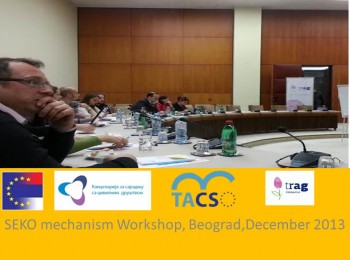
Serbia and EU Emissions Trading System
Environmental Ambassadors representatives attended the presentation of the Twinning project „Creation of a monitoring, reporting and verification system for the successful implementation of the EU Emissions Trading System“ held in the Chamber of Commerce and Industry of Serbia on November 13, 2013.
In addition, we would like to to underline UN climate talks in Warsaw side event: Opportunities and Challenges for Climate Action in Western Balkans and Turkey, held on November 11 in Warsaw.
Eye on environmental laws changes: monitoring compliance with EU directives
On November 5th, 2013, ENV.net Serbia representative participated in the Meeting where draft changes on Law of Waste was presented by Ministry of Energy, Development and Environmental Protection. Meeting was organised by Serbian Chamber of Commerce. Presentation was followed by discussion and about 140 persons participated. The day before, draft changes on Law of Environment were presented.
EASD / ENV.net Serbia is concerned that some of changes should be carefully checked related to compliance with relevant EU directives.
The third ENV.net partnership meeting in Milan, November 2013
The third partnership meeting of organizations from six countries participating in ENV.net project is being held from 5-8. November, 2013., in Milan, Italy.
The first day was dedicated to presentation of activities undertaken in the last months and description in details how each partner organisation is planning to implement activities foreseen in the project strategy in 2014. In the afternoon of the 1st day a practical training session on the use of social networks was delivered by Claudia Vago, consultant.
The 2nd day was dedicated to the EEB Training session on advocacy and monitoring the approximation process to the environmental acquis. In the 3rd day, a Training of Trainer (ToT) was organised in order to identify a common methodology to be used, followed by a short information session on how to use the website, to add pages and posts. The 4th day was focused in defining the project strategy and specific activities for 2014.
Education for Sustainable Development: UNESCO call for contributions
The monitoring and evaluation process for the United Nations Decade of Education for Sustainable Development (DESD) is designed to capture a variety of activities related to ESD and take stock of the growth of ESD throughout the DESD. The final assessment and report will summarize and highlight the accomplishments of the DESD, convey lessons learnt and point the way for post-Decade efforts.
UNESCO call for inputs by answering before 31 October 2013 the online questionnaire.
ENV.net snapshot analysis: While waiting for EC 2013 Progress Report
ENV.net snapshot analysis
Legislation: In terms of the degree of compliance with the EU environmental acquis, intense legislative activity of the Ministry in charge of Environment and other institutions with responsibility in this area has led to a significant level of transposition of the relevant EU regulations. According to the Progress Monitoring Report for the year of 2012, the majority of EU directives relating to the so-called horizontal issues, nature protection, management of chemicals and noise are completely or almost completely transposed into national legislation. In other areas (air quality, waste management, water protection and industrial pollution control) the bulk of EU legislation has largely been transposed into national legislation. With regard to the obligations of the Republic of Serbia as a non-Annex 1 country in the UN Framework Convention on Climate Change and the complexity and cost of implementation of these regulations, the compliance with the acquis in the climate package has just started. National Environmental Approximation Strategy, with the assumption that the Serbia will be a member of the EU by 2019, provides for the achievement of full transposition of most of the acquis by the end of 2014.
Administrative and institutional capacity: The existing administrative capacity, especially at the local level are assessed as insufficient for adequate implementation. Given the complexity of the environmental acquis, and the fact that the jurisdiction of the EU is divided between a numbers of institutions in this area, there is a strong need to further strengthen inter-agency cooperation and coordination.
Environmental infrastructure: Given the state of the infrastructure, as well as the experience of the new EU member states in this process, the Strategy estimates that full implementation of EU regulations will be completed by 2030, and that the total cost of full implementation of EU legislation in the field of environment will be around 10.6 billion euros.
Financial investments: Given the institutional complexity and multidisciplinary nature of the field of environment, full transposition of the acquis may require a longer time frame, especially in the case of directives that require large financial investments (heavy investment directives).
Year 2013: The activities in the sector stagnated in 2013, and it is to be seen how it will be reported in the 2013 Progress Report, as well as to see the further “speed” to implement commitments in environmental sector.
EASD participated in the process towards Progress report for 2013 (2013-Progress-Report-EASD-contribution).
BLUE FLAG
The iconic Blue Flag is one of the world’s most recognised voluntary eco-labels awarded to beaches, marinas, and sustainable boating tourism operators. In order to qualify for the Blue Flag, a series of stringent environmental, educational, safety, and accessibility criteria must be met and maintained. National operator in Serbia is EASD.
EASD Activity circles represent the scope of our activities. EASD was approved as the FEE FULL MEMBER ORGANISATION at FEE GA in June 2014.
Related documents for application , as well as activities, are posted in Serbian , and on separate FEE Serbia web page.
__________________________
Blue Flag NOM 2024 October 15-18, Tobago
Blue Flag NOM 2018 in Greece: EASD participate
EASD participate at 2017 Blue Flag National Operator Meeting
Serbia: Blue Flag 2017 Ceremony at beach on “Belgrade Sea”
2017 International Year of Sustainable Tourism for Development
November 2016: Serbian Visions 2016 : Blue Flag and Green Key programs presented by FEE SERBIA (EASD)
October 2016: Blue Flag NOM 2016: EASD participate
June 2016: Blue Flag for Ada Ciganlija beach
January 2016: National jury and Committee for FEE programs in Serbia
October 2015 EASD at 2015 Blue Flag NOM
October 2015 SDGs as the relevant part of the context within which FEE operates
Blue Flag 2015 National Jury Meeting, January 2015
Blue Flag 2014 National Jury Meeting , February 2014
__________________________
National FEE Committee Meeting, September 6, 2013
__________________________
In 2013 Ada Ciganlija-Sava Lake Beach in Belgrade deserved the second time this important international certification.
Activity on Blue Flag Beach in Serbia among the five continental winners of the 3rd IOC Sport and Environment Awards. This is recognition for outstanding initiatives in the field of environment and sustainable sport, in particular cleaning the bottom of the lake. See also FEE site.
__________________________
In the publication ENVIRONMENTAL EDUCATION ACTIVITIES HANDBOOK 2013, 3 pages are examples from Serbia: Serbia, p.18, Serbia, p.28 and Serbia, p.71
__________________________
2013 Blue Flag National Jury meeting held in February 2013.
_________________________
In 2012 only Ada Ciganlija-Sava Lake Beach in Belgrade deserved this important international certification. Nominated by National Jury to be awarded with Blue Flag in 2013 (noted in media )
FEE Serbia International Mentor in Monitoring visit to Serbia, June 2013
Mr Riza Epikmen, member of the FEE Board of Directors , as the International Mentor for FEE Serbia (Environmental Ambassadors for Sustainable Development), visited Serbia from June 14-16, 2013. The FEE Board responsibilities include ensuring compliance with the organisation’s objectives/values, recommending policies/plans, approving membership applications and monitoring performance in relation to plans, budgets, etc. In 2011 and 2012 International Mentor for FEE Serbia was Michael Ierides.
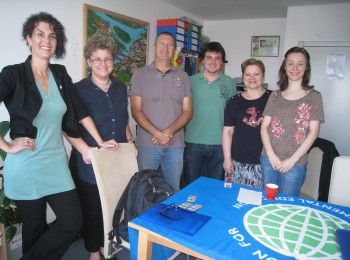 On June 14th he visited FEE Serbia office, where he had the first meeting with EASD core team, including National FEE Mentor Andjelka Mihajlov, National Blue Flag Program Coordinator Sandra Radunovic and Assistant to National Eco-Schools Coordinator Dragana Grujicic.
On June 14th he visited FEE Serbia office, where he had the first meeting with EASD core team, including National FEE Mentor Andjelka Mihajlov, National Blue Flag Program Coordinator Sandra Radunovic and Assistant to National Eco-Schools Coordinator Dragana Grujicic.
In order to be informed of Eco-Schools Program implementation, he visited school “Drinka Pavlovic” , applied for “Eco-School” award and waiting for Jury decision. Dedicated teachers and director presented how the school is implementing program.
On meeting in the premises of Tourist of Organization of Serbia, members of FEE National Council and ministries competent for environment and tourism representatives have constructive discussion with Mr Epikmen, focused on his advice related to Green Key Program implementation and plan of FEE Serbia to become FEE full member in 2014.
On June 15th, he has site visit to 2013 Blue Flag Beach (Ada Ciganlija-Sava lake) and participated in ceremony for Blue Flag 2013 season opening.
Minutes from Monitoring visit are in the Gallery.
SECO: Establishing a partnership to promote the use of international assistance
Within the project “Support to the Department of Planning, Programming, Monitoring and Reporting on EU Funds and development assistance to the Office for European Integration of Serbia, for establishing a partnership to promote the use of international assistance “in March 2011 the mechanism was established, enabling civil society participation in planning and monitoring of EU and other international development assistance.
SEKO leading organization for the sector of environment and energy is a consortium of organizations (selected in a public competition):
CEKOR-Centre for Ecology and sustainable development,
ENVIRONMENTAL AMBASSADORS FOR SUSTAINABLE DEVELOPMENT, and
Center for Civil Society Development PROTECTA.
SEKO Leading organizations are forming network NGO SEKO Forum “Environment and Energy” to work together to provide opinion related to official documents in the programming process, the identification of priority programs / projects, defining the strategic basis for defining priority projects for international assistance. 48 CSO are the member of this network, and it is open for the new members.
More information can be found (in Serbian) http://www.cdspredlaze.org.rs/
_________________________
January 30,2014 – Thematic meeting of the SECO mechanism on IPA II programming
December 16, 2013: Workshop for strategic planning of further work SECO mechanism
_________________________
Activities include:
EASD prepared Opinion and contribution to the Draft Strategy Paper for the Republic of Serbia 2014-2020. Through SECO mechanism opinion is sent to Governmental Office for European Integration. Opinion is based on Serbia 2013 Progress Report and Strategy – Reading by ENV.net Serbia Team .
___________________________________________
More details on activities in Serbian language……..
Projects 2004-2011
- Sustainable Development and Environment towards EU: “EnE – Environment to Europe” Conferences 2005, 2006, 2007, 2008, 2009, 2010, 2011, in cooperation with Serbian Chamber of Commerce
- E-communication standards , 2011, supported by Ministry of Environment and Spatial Planning
- “Support to the Department of Planning, Programming, Monitoring and Reporting on EU Funds and development assistance to the Office for European Integration of Serbia, for establishing a partnership to promote the use of international assistance “, participant as the member of leading SEKO Consortium for Environment and Energy, 2011 ,
- Ecological footprint: analysis and training, project supported by UNESCO, 2011
- Possible aspects of environmental protection and natural resource management for Rural Development, supported as advisory project in the “Project on Transitional Agriculture Reform,” World Bank , 2011, 2011/2012, the Ministry of Agriculture, Forestry and Water Management of the Republic of Serbia
- Environment Forum , project supported by EC (DG Environment)
- Analytical study of the impact of air pollution on the population in selected urban locations (Pancevo, Vrsac, Bor), (participation in the project with the questioning of citizens in selected locations on the subject), a project supported by the ministries responsible for the environment and for science
- Hazardous Waste Management, TAIEX DG Enlargement INFRA 32384 project, 2009
- Say Yes to Palilula , project supported by City of Belgrade Municipality Palilula
- Modify habits – keep Belgrade clean!, the project supported by the Secretariat of Environment of Belgrade
- Hit the right tone by use environmentally friendly rules , project supported by City of Belgrade Municipality Vracar
- Regional environmental advocacy and cohesion of the Western Balkans (abbreviation: REA), Project supported by the Embassy of Nederland (2009-2011) , REA Project Snapshots , Courses
- Children – the guardians of municipality, project supported by City of Belgrade Municipality Vozdovac
- Local Environmental Security (abbreviation: LES), project supported by OSCE in Serbia, LES Brochure
- Keep it healthy, keep it green, keep it European , project supported by NDI
- Involvement of NGOs in Serbia in the research of renewable energy sources, a project supported by the EU
- My Belgrade – My Environment , the project supported by the Secretariat of Environment of Belgrade
- Local strategic planning , project supported by City of Belgrade Municipality Stari Grad
- Technology Transfer Partnerships, project supported by CIDA
- Sustainable development and environmental leaders for tomorrow, 2006/2007, MATRA
- Building a common ‘green’ future in Europe (Regional Initiative for cohesion in the field of environment), project supported by Open society Fund
- RENCO – Regional Environmental Cohesion: Towards sustainable development strategy for urban South-East Europe, project supported by Sida and Ministry of Environment
- Women as the Voice for Sustainable Development and Environment , project supported by CIDA, WAVE_Report_2007-draft
- Education courses for provincial and local authorities on public participation in decision-making related to the Environmental Impact Assessment and Strategic Impact Assessment , Project supported by Ministry of Environment

